History of English Middle English Reestablishment of

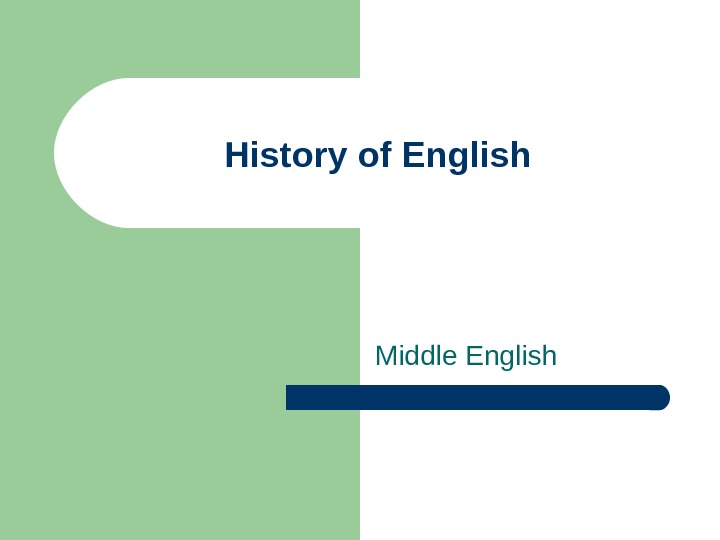
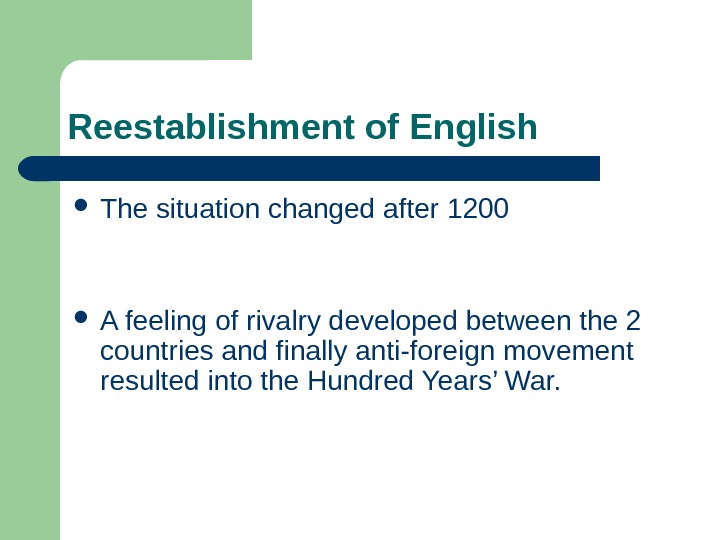
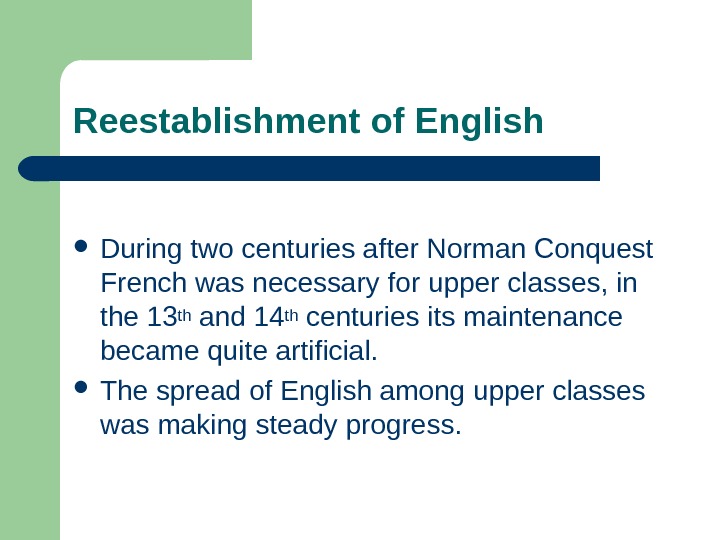
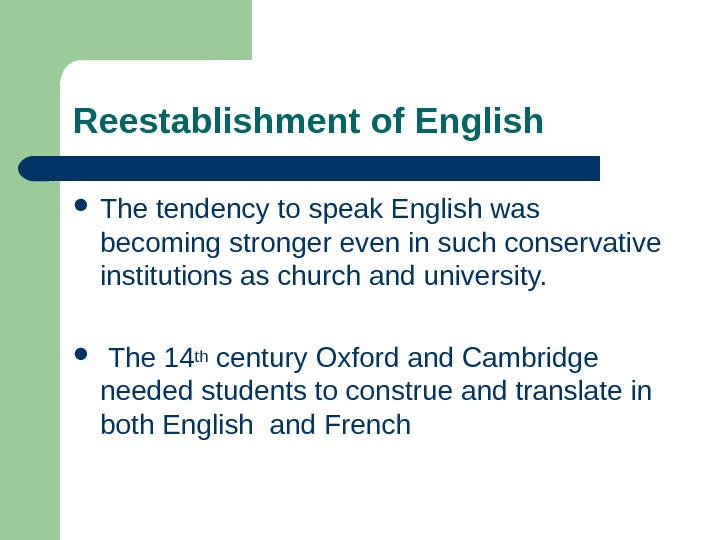
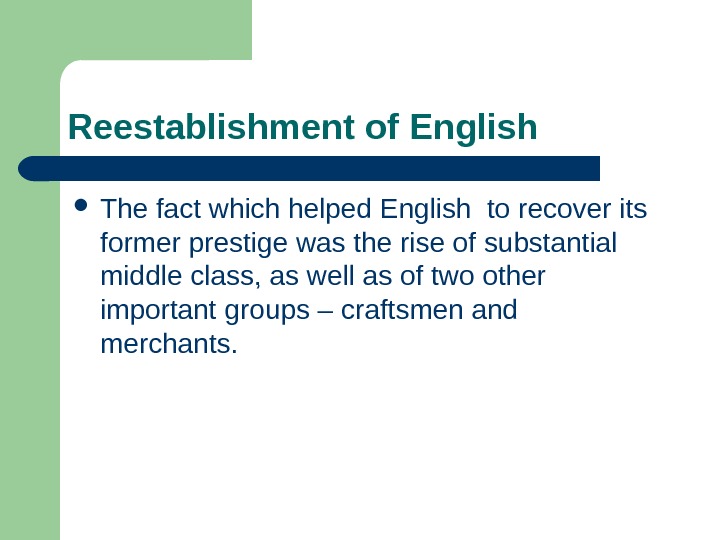
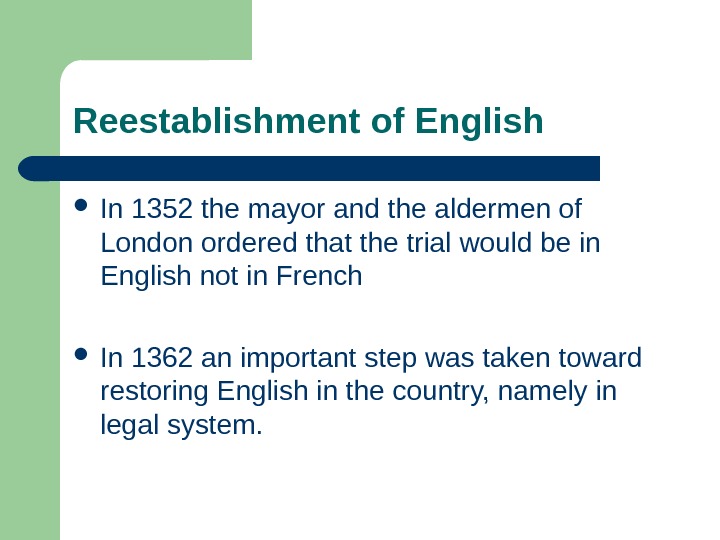
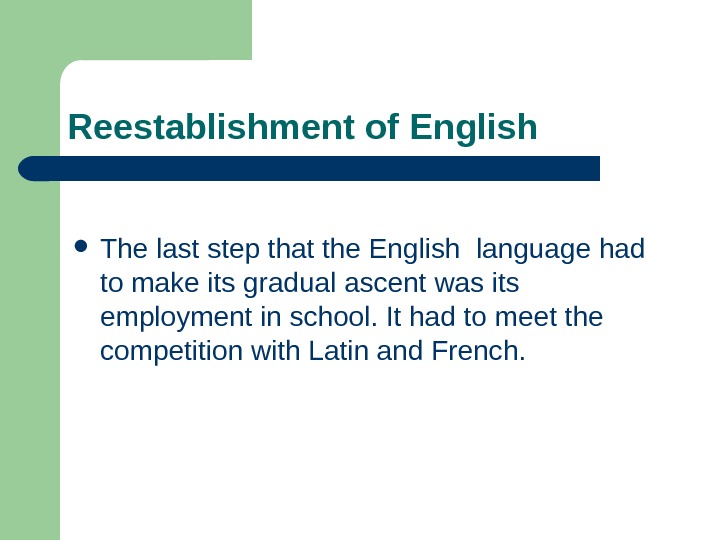
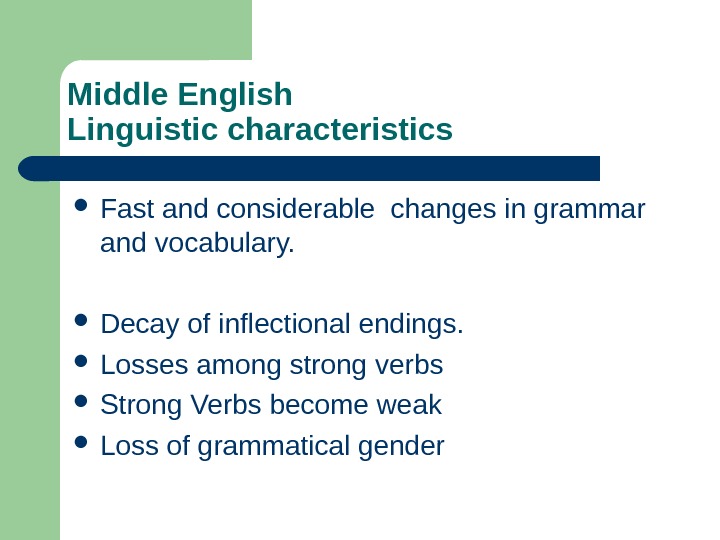
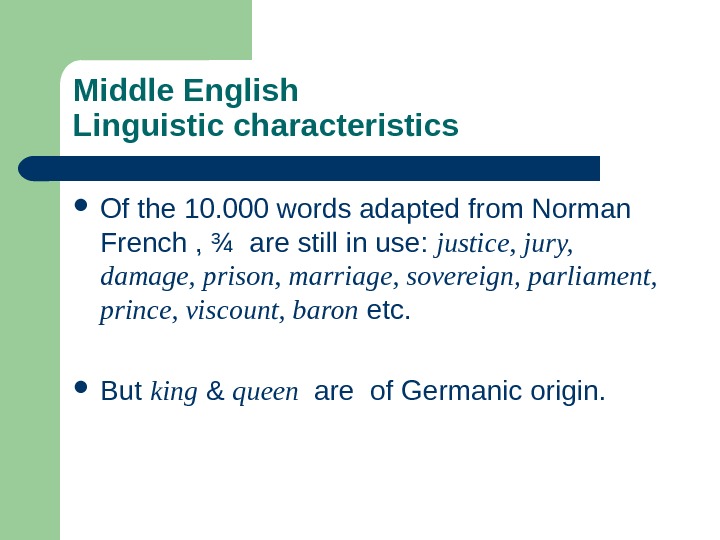
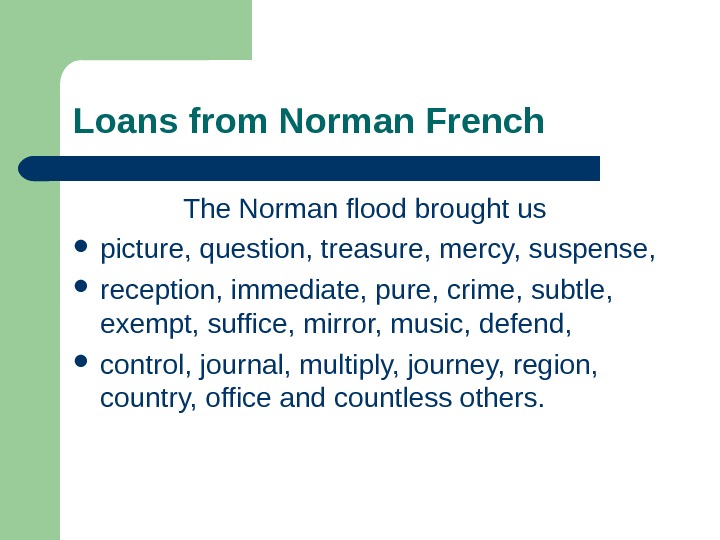
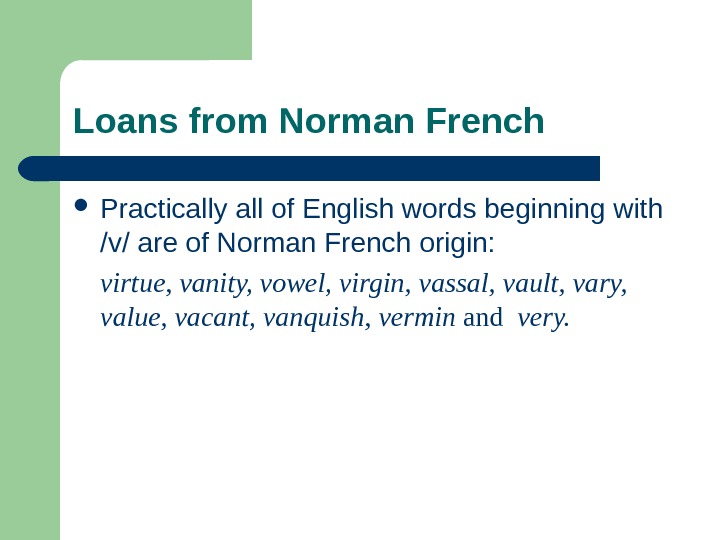
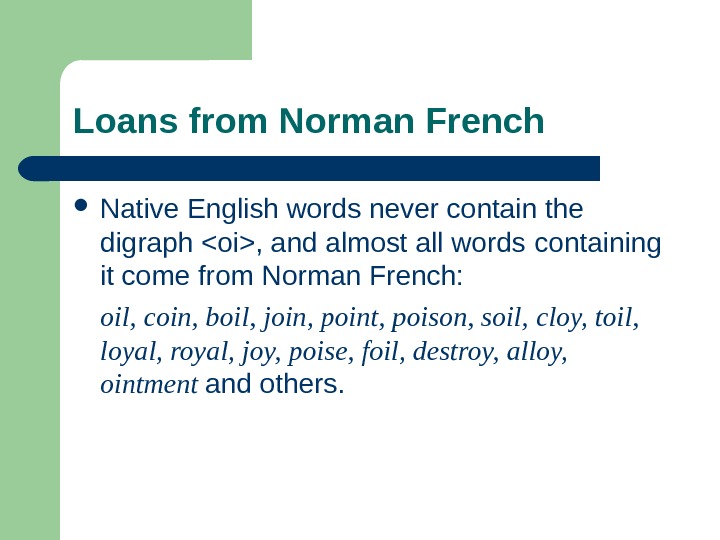
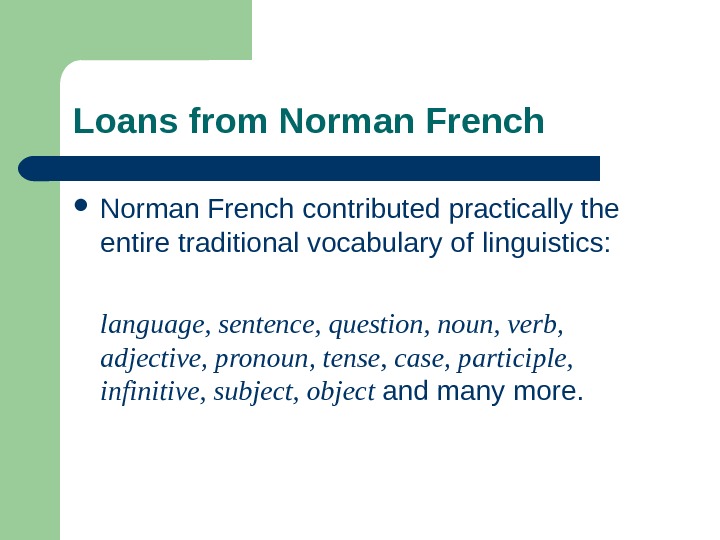
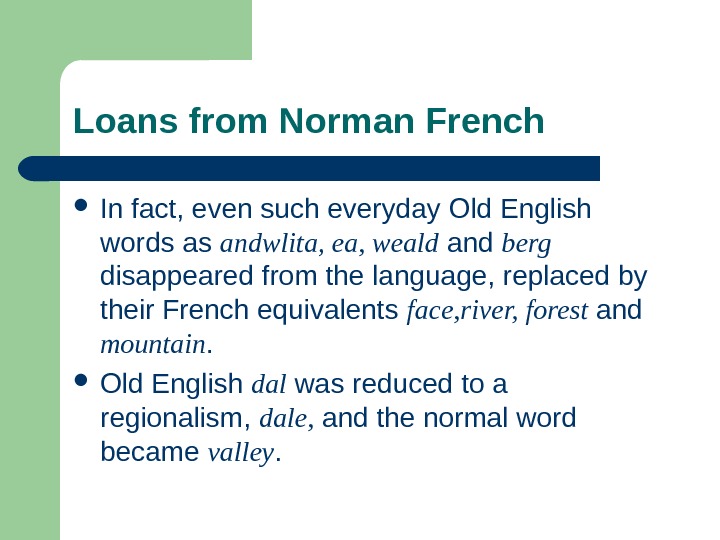
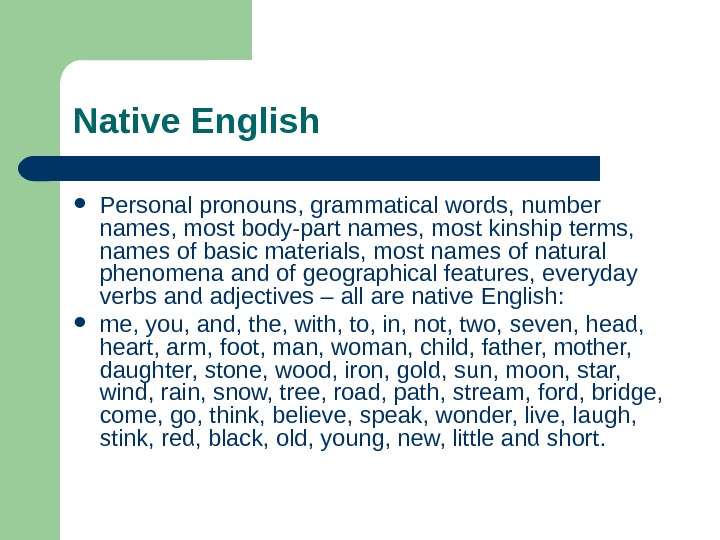
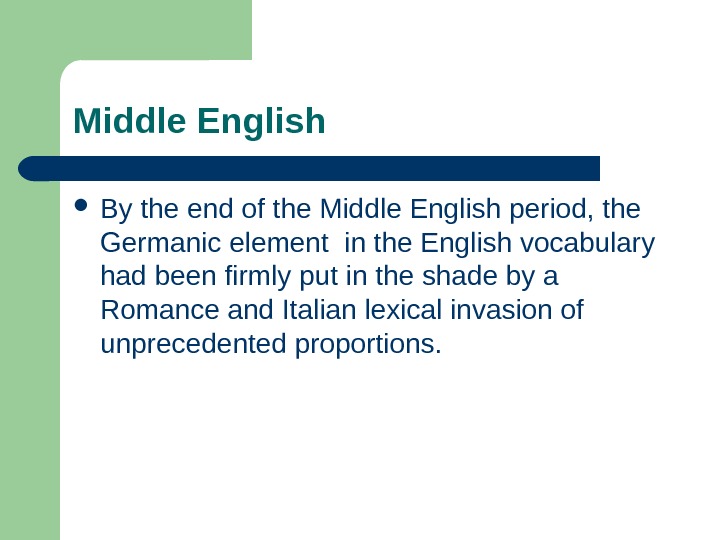
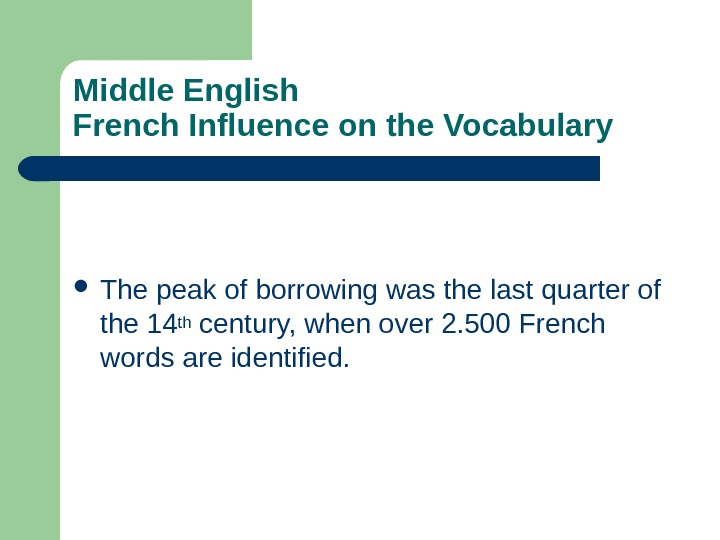
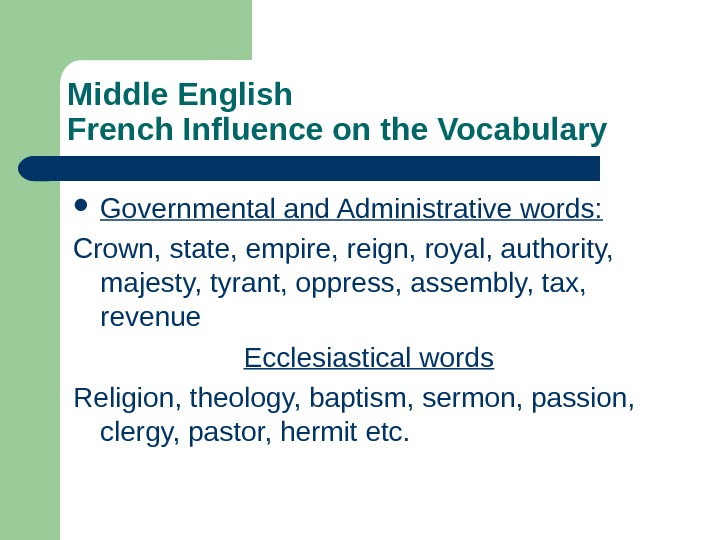
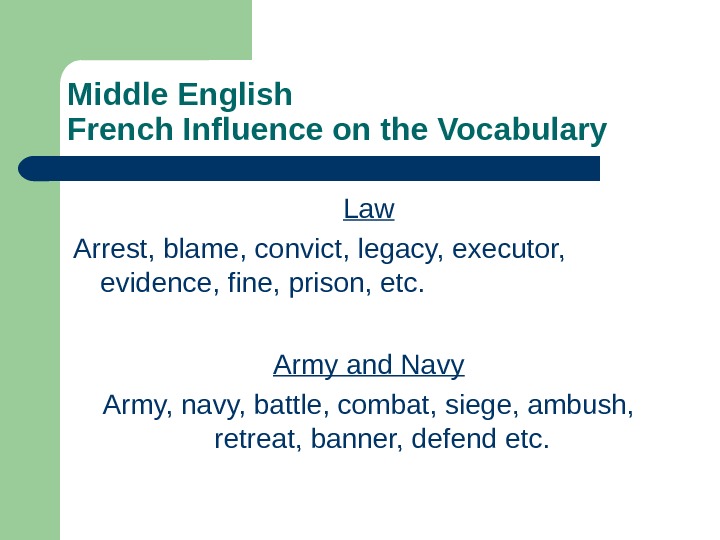
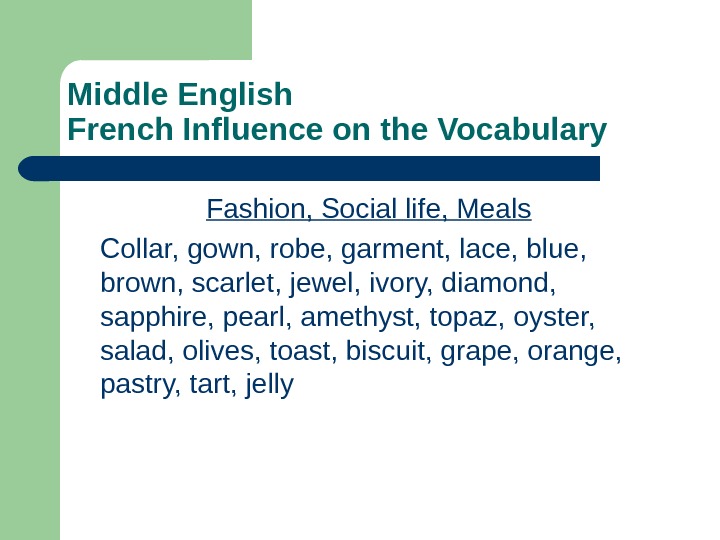
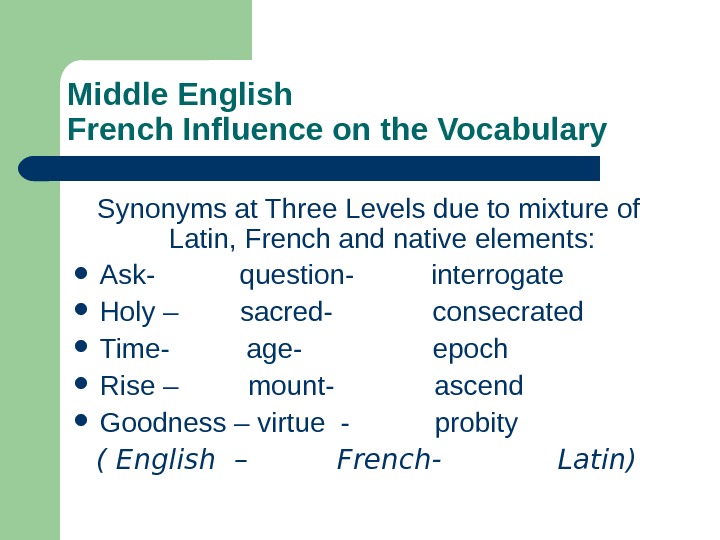
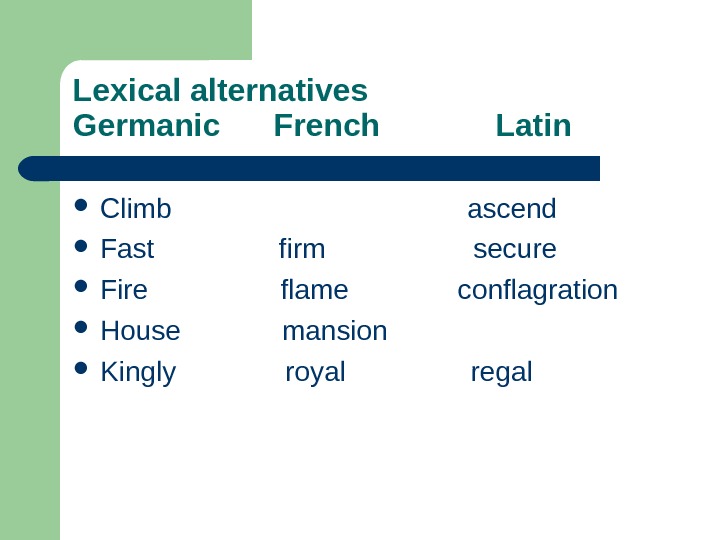
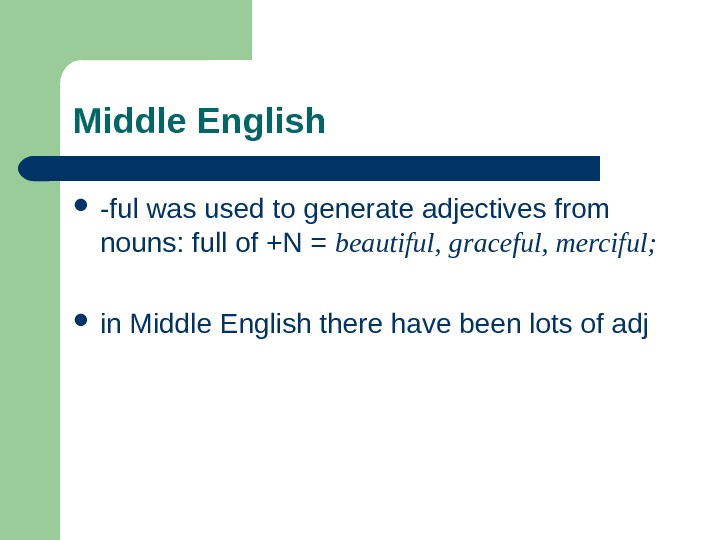
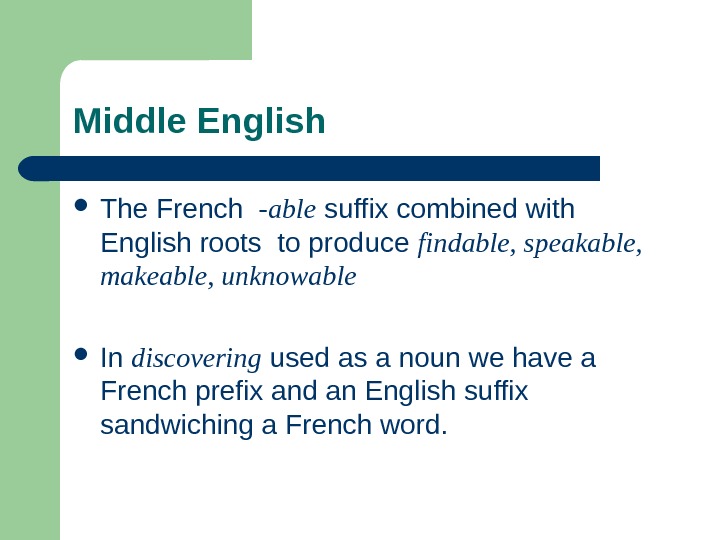
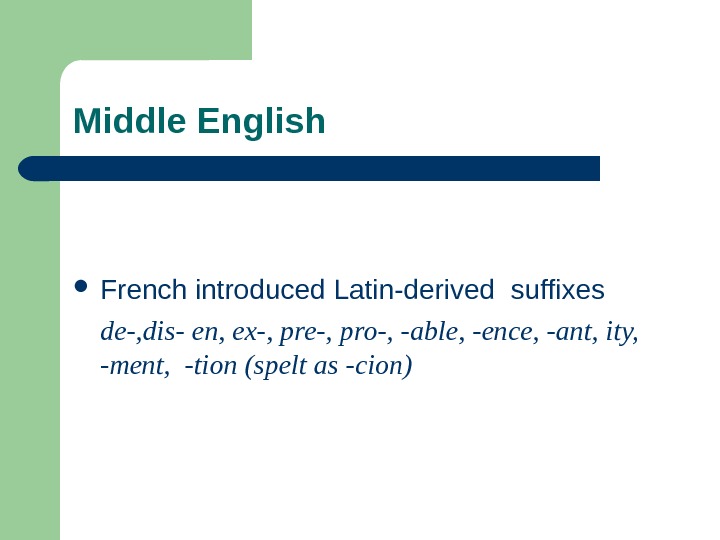
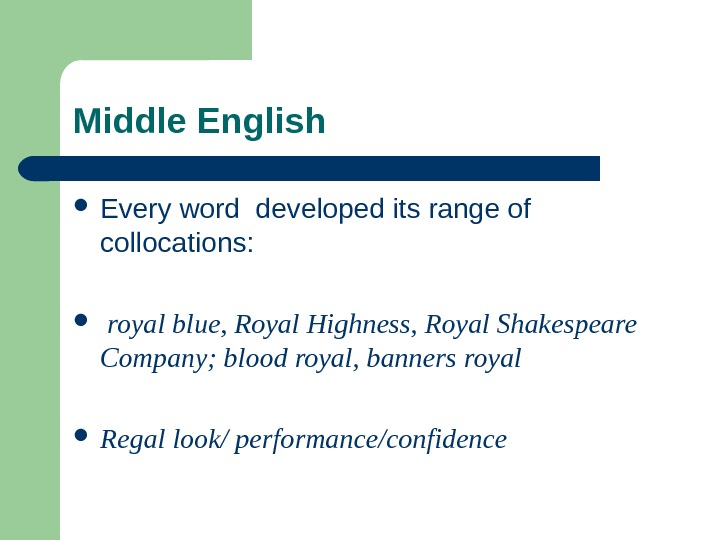
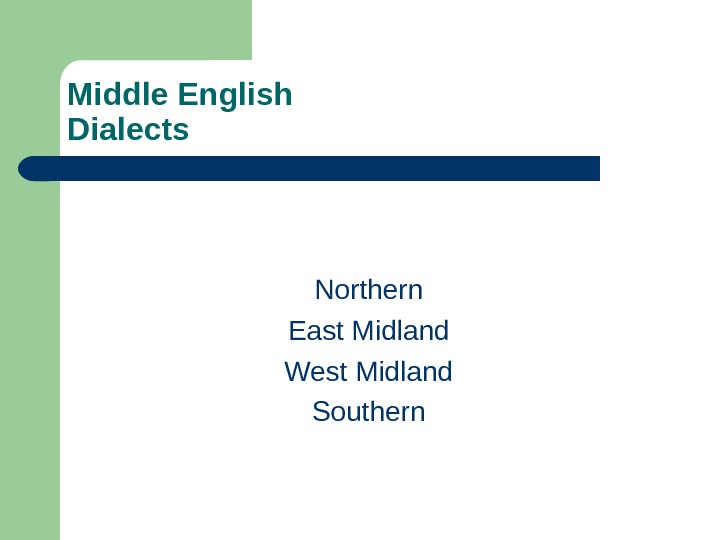
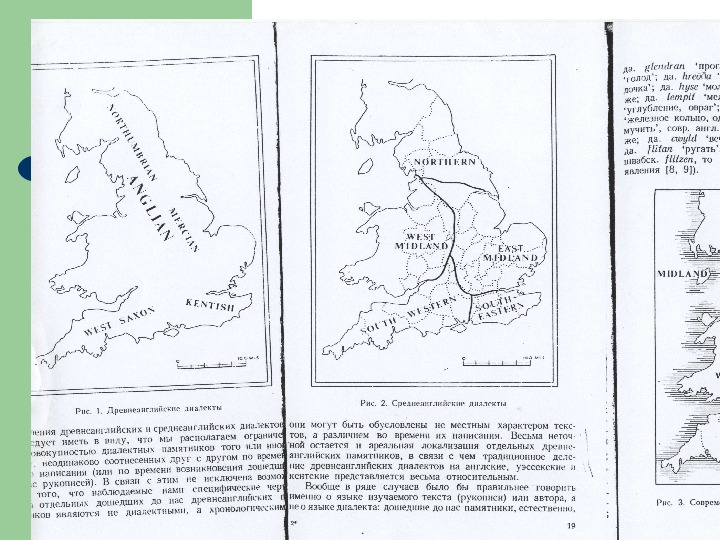
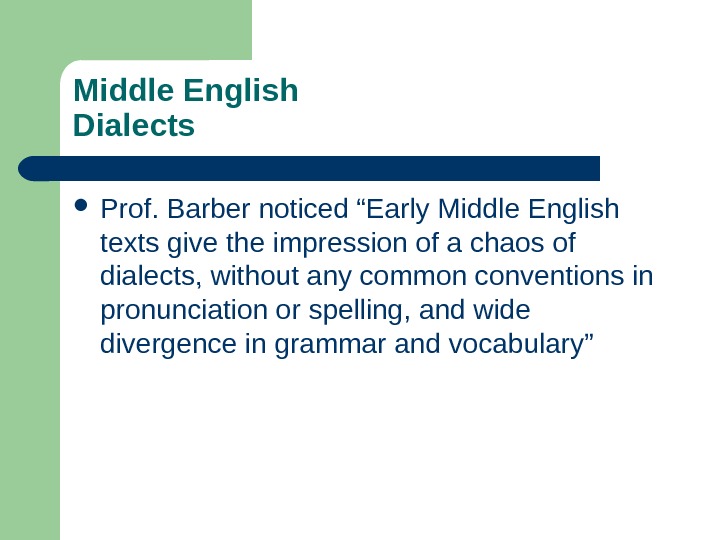
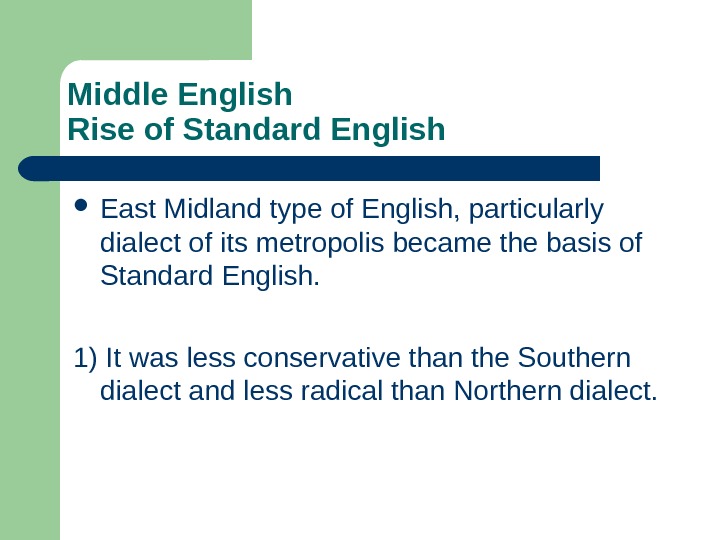
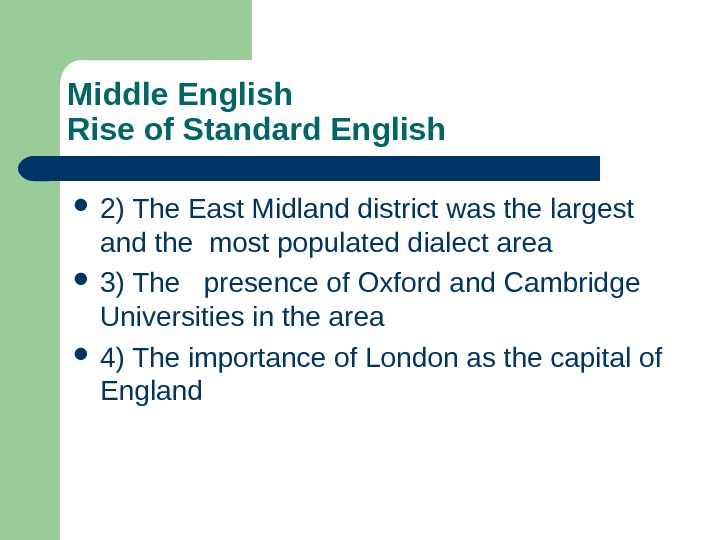
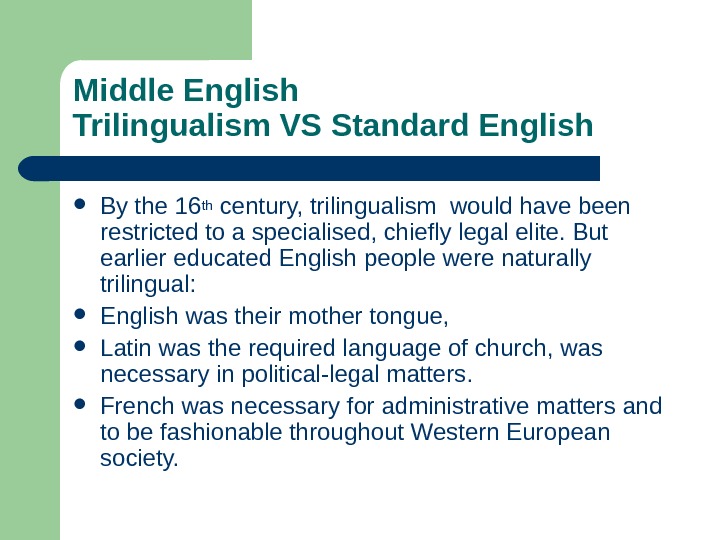
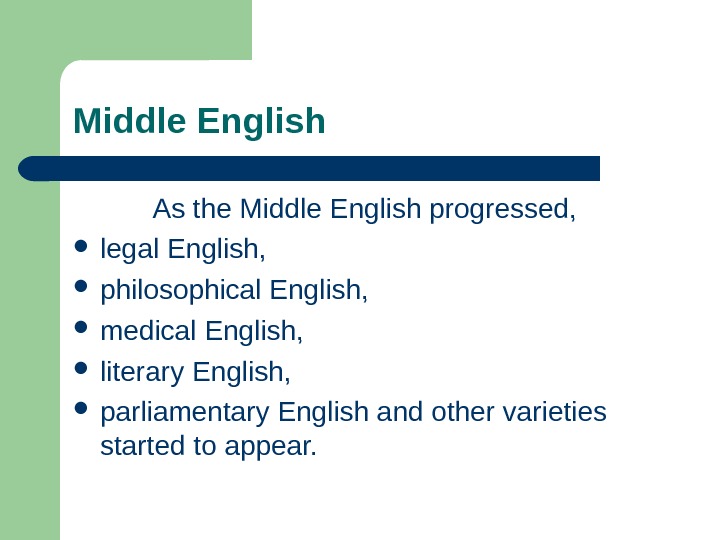
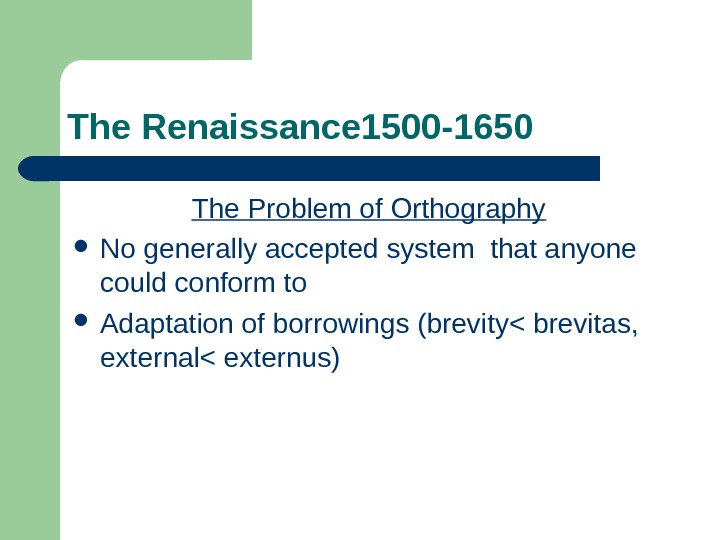
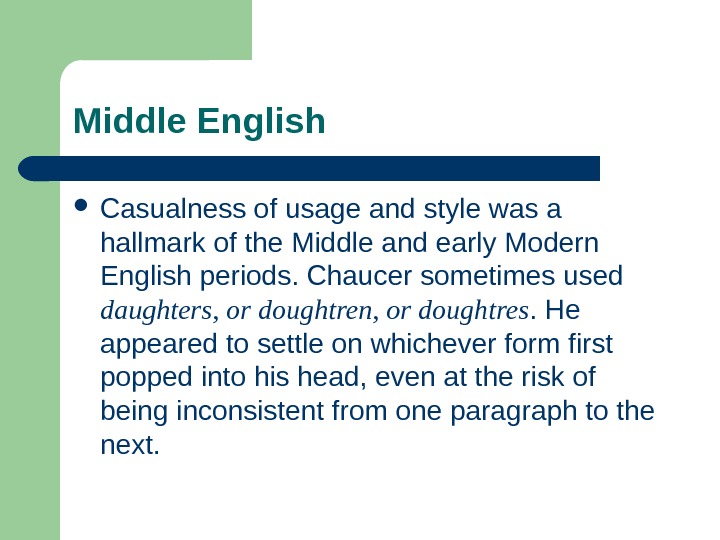
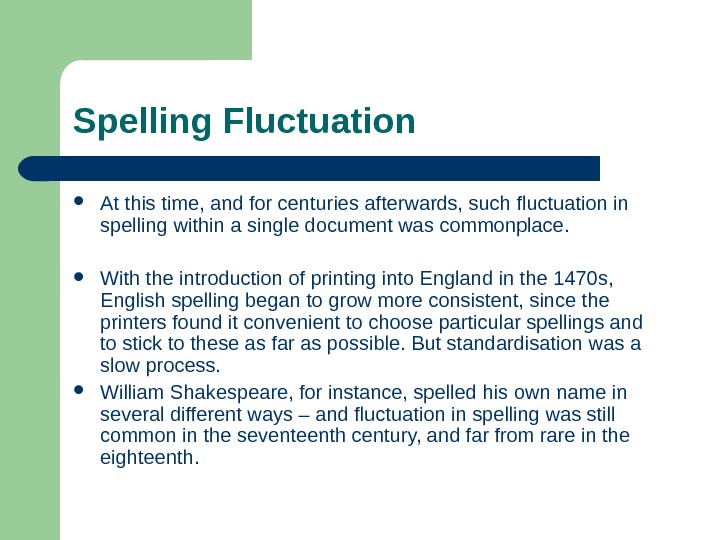
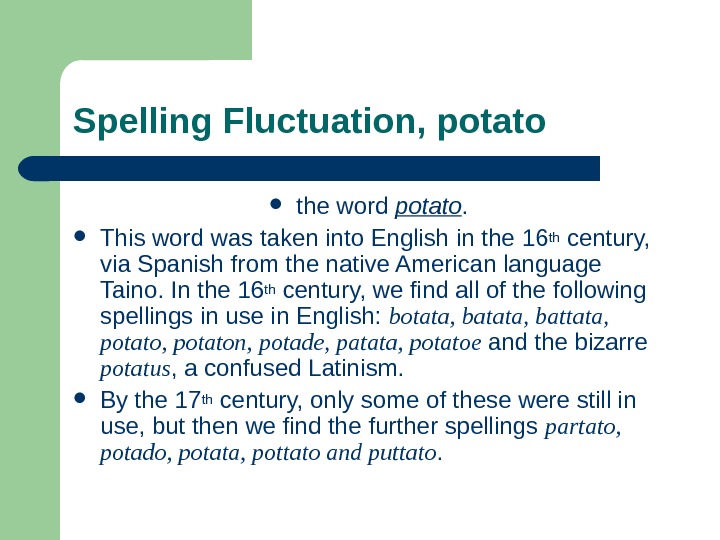
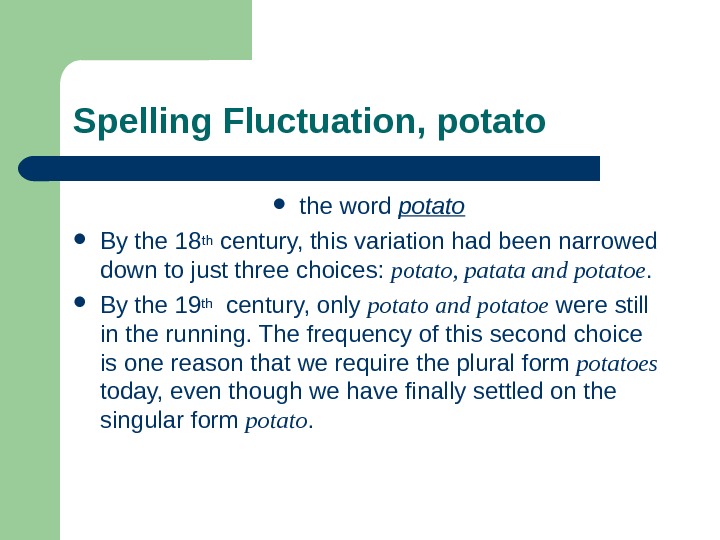
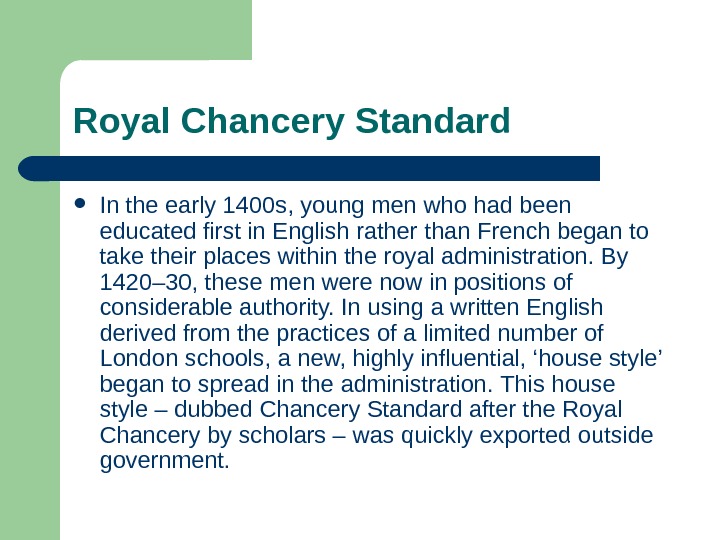
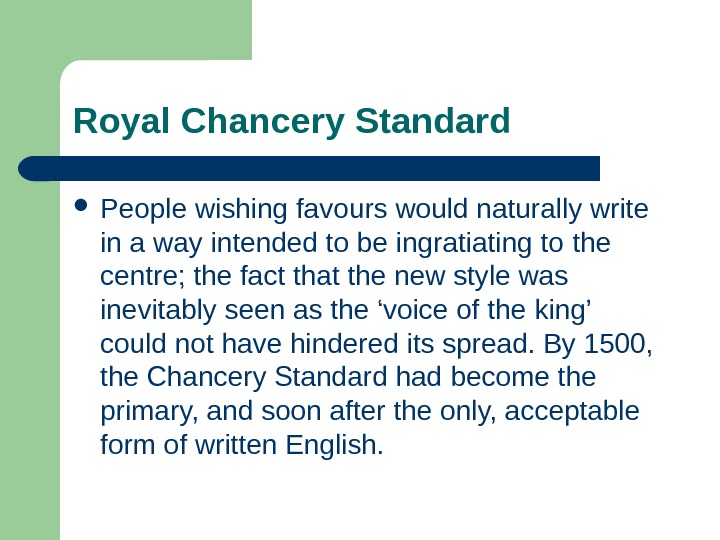
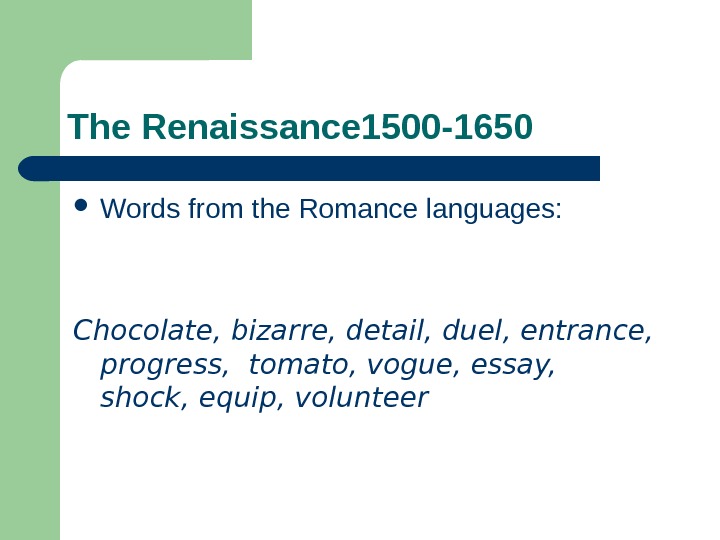
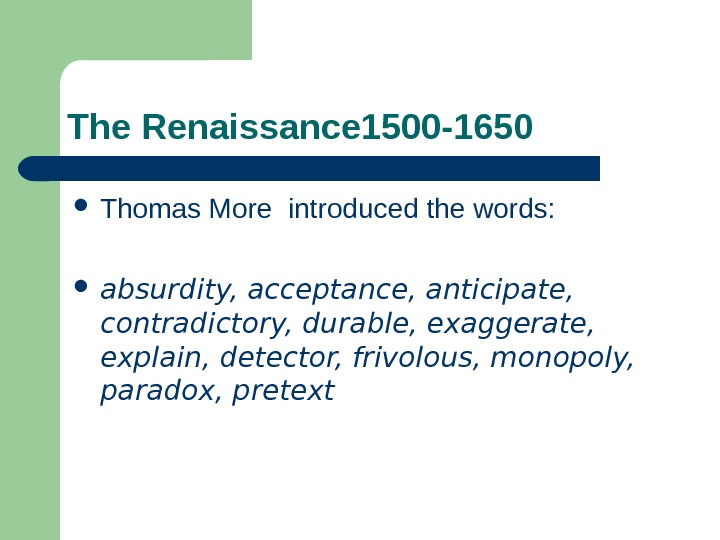
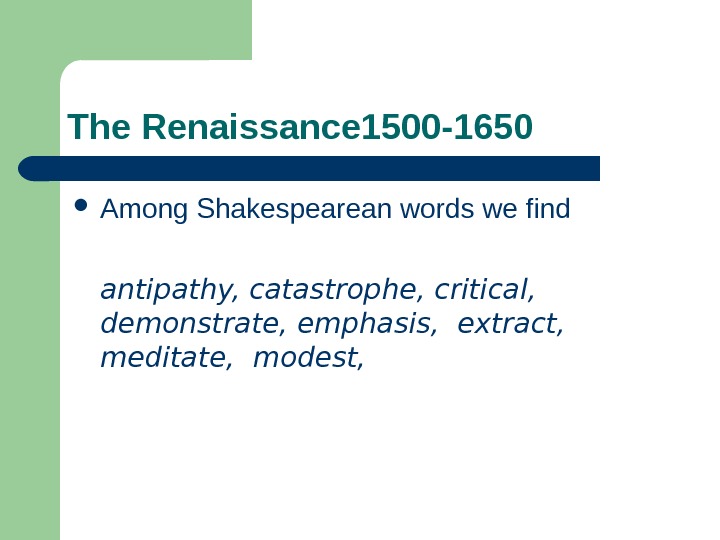
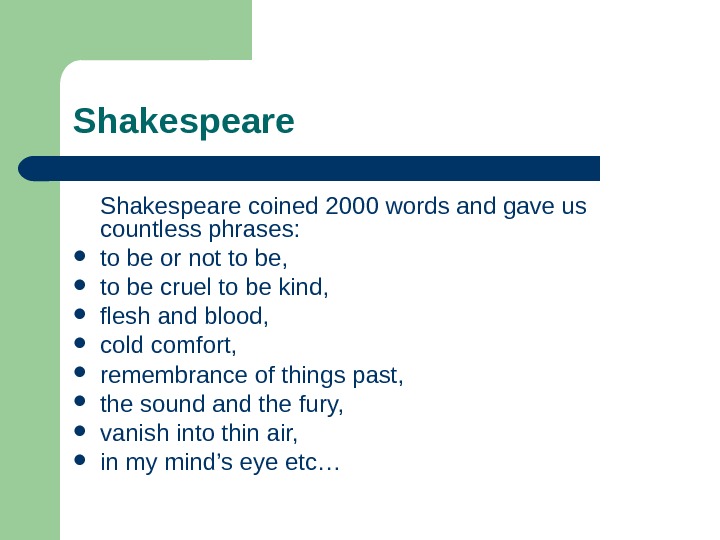
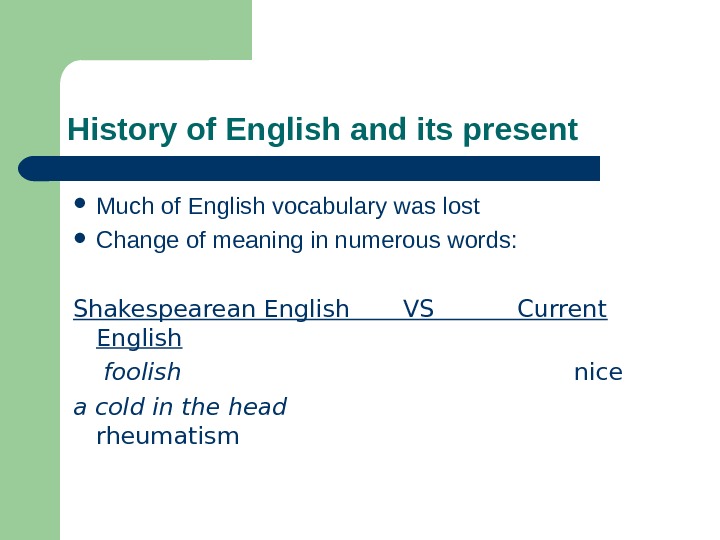
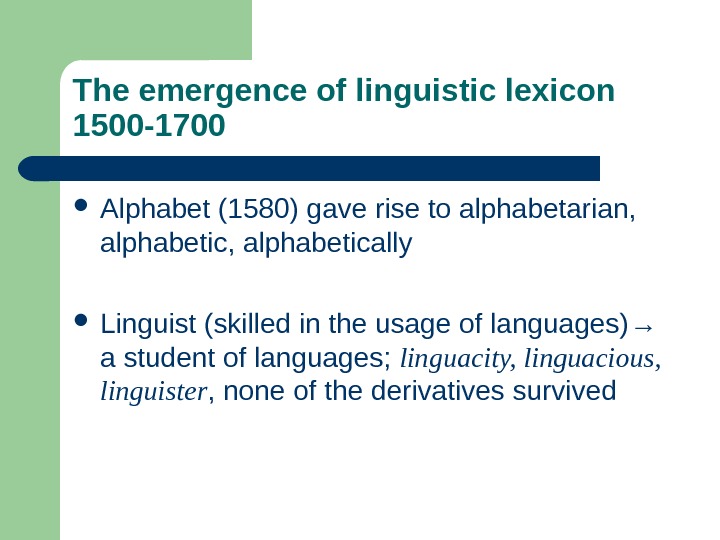
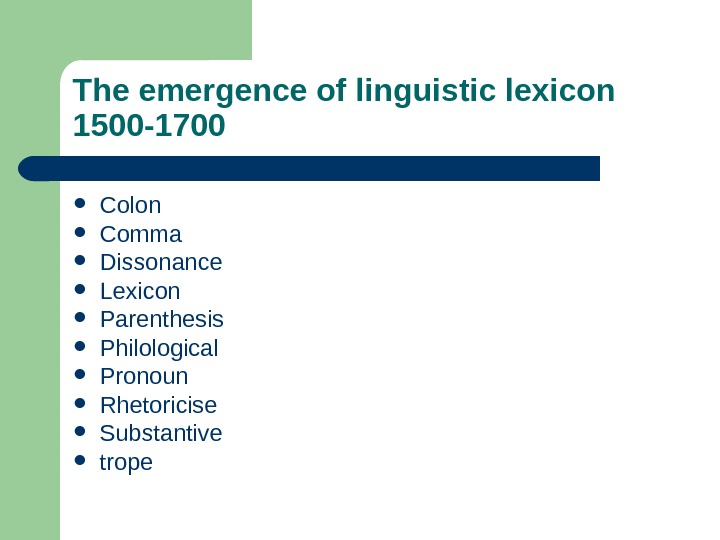
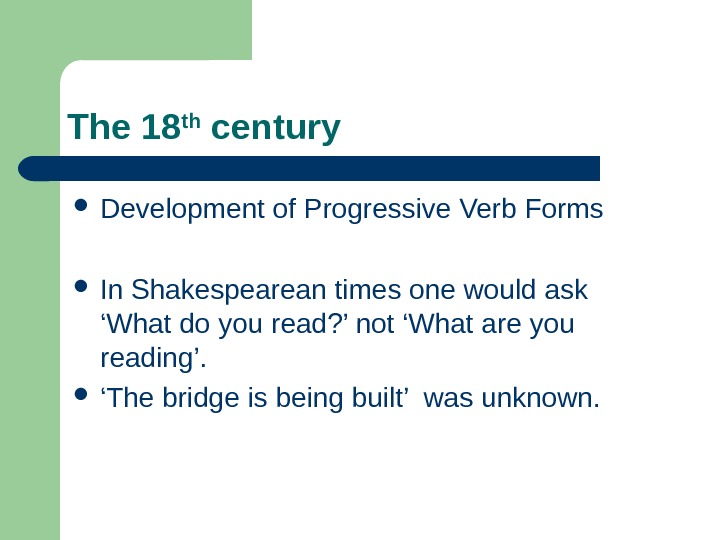
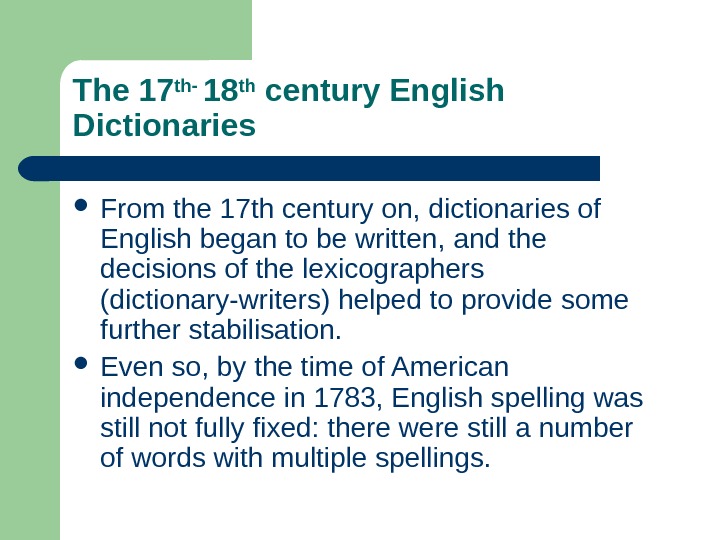
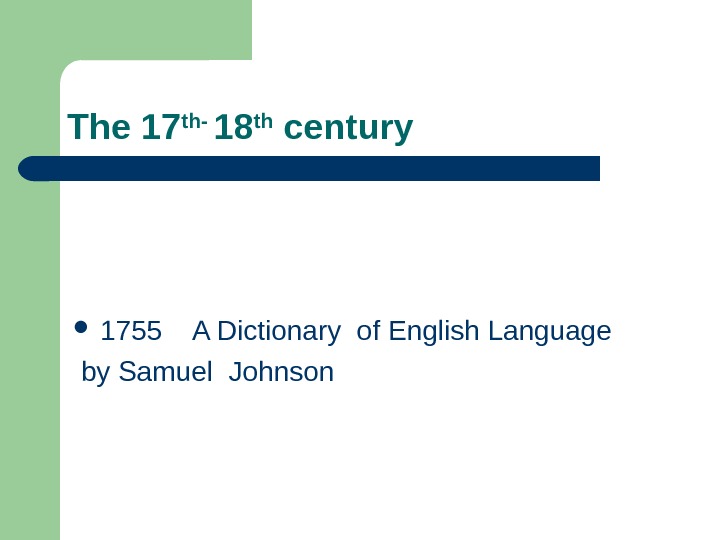
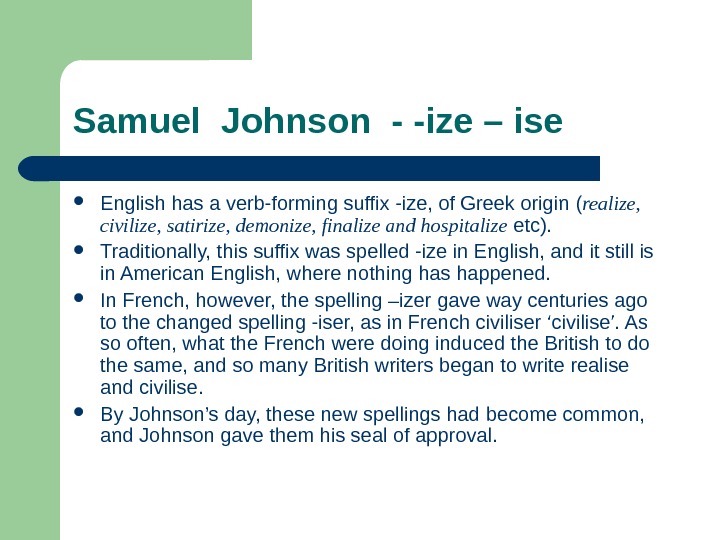
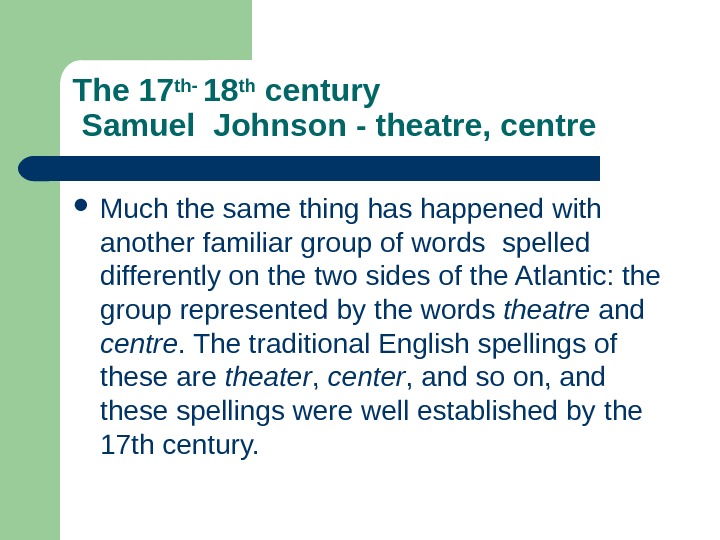
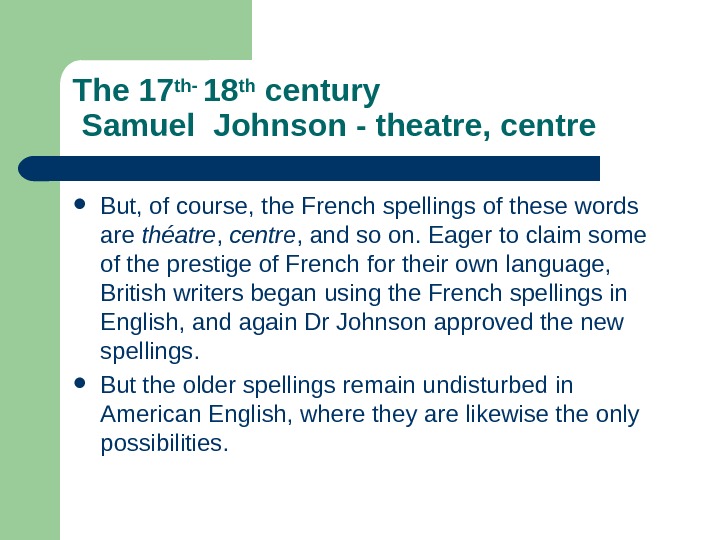
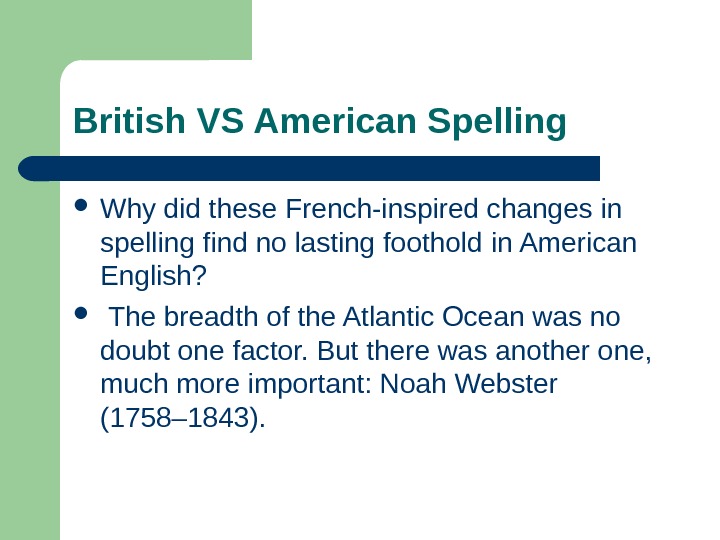
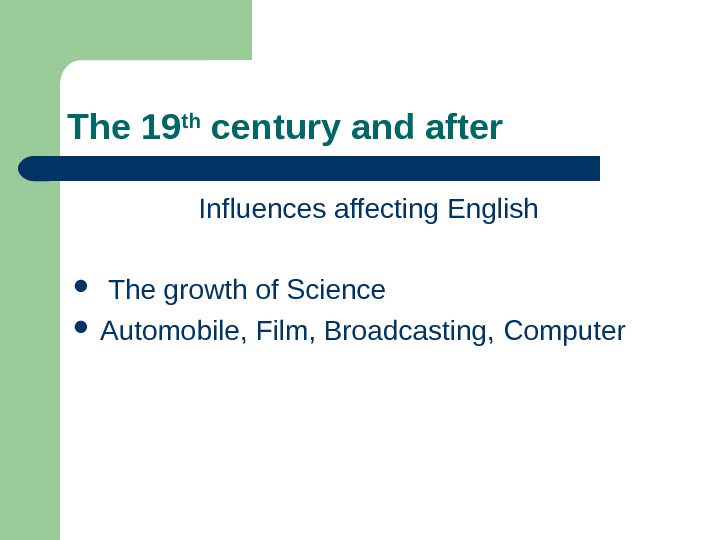
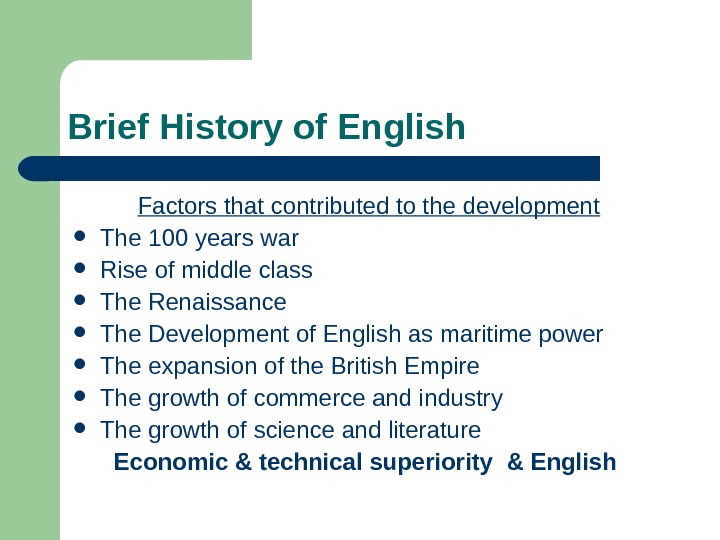
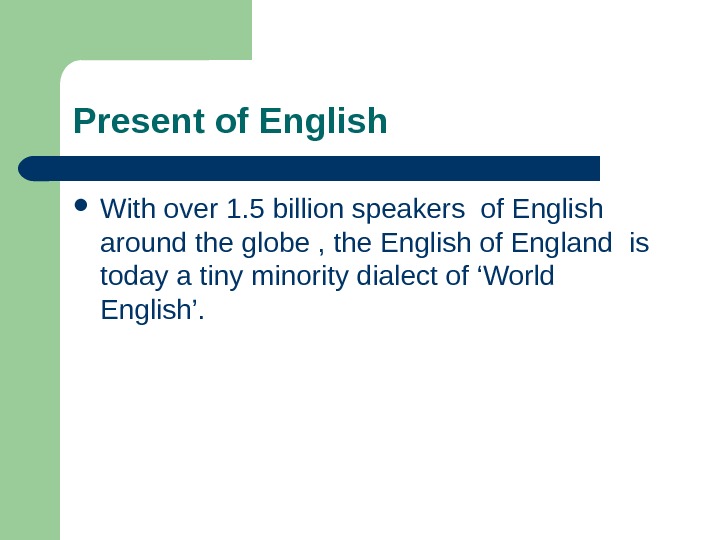
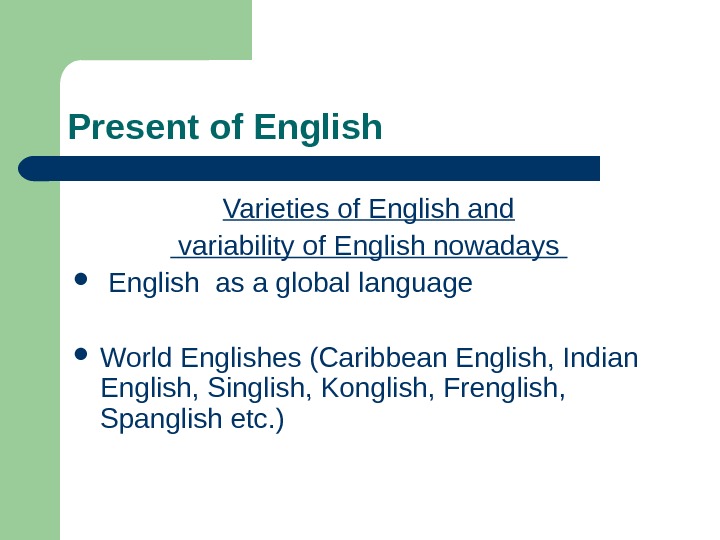
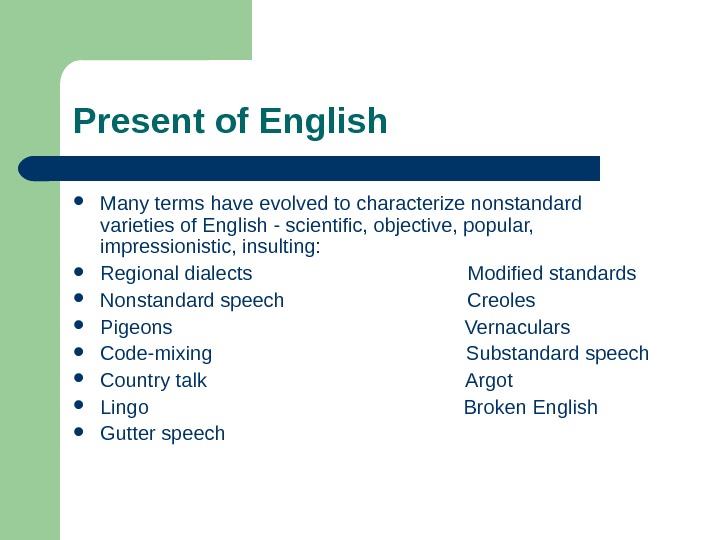
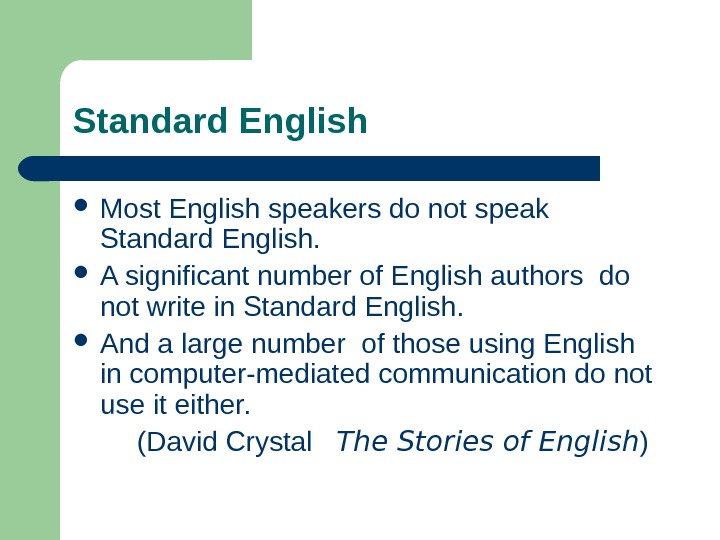
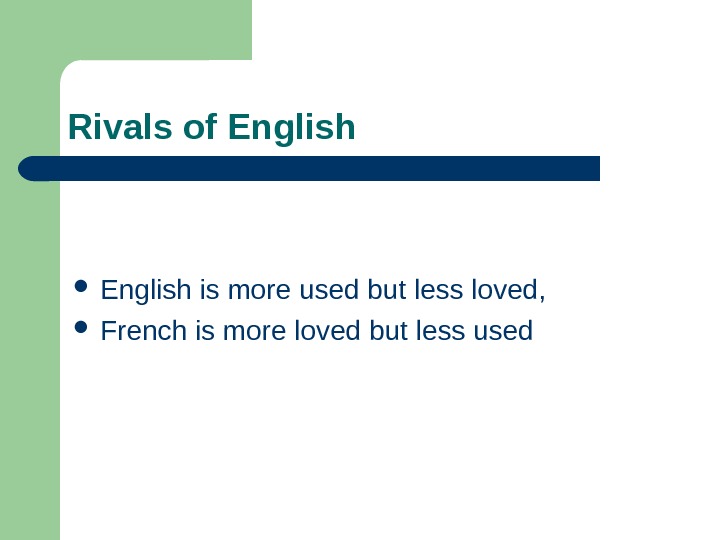
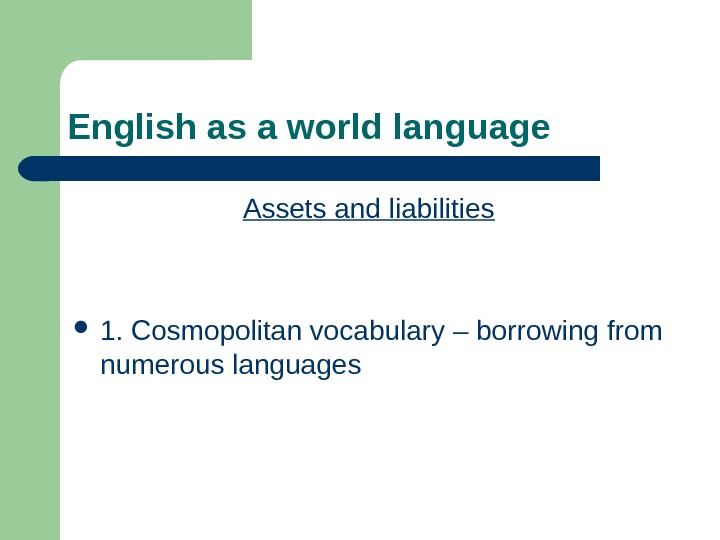
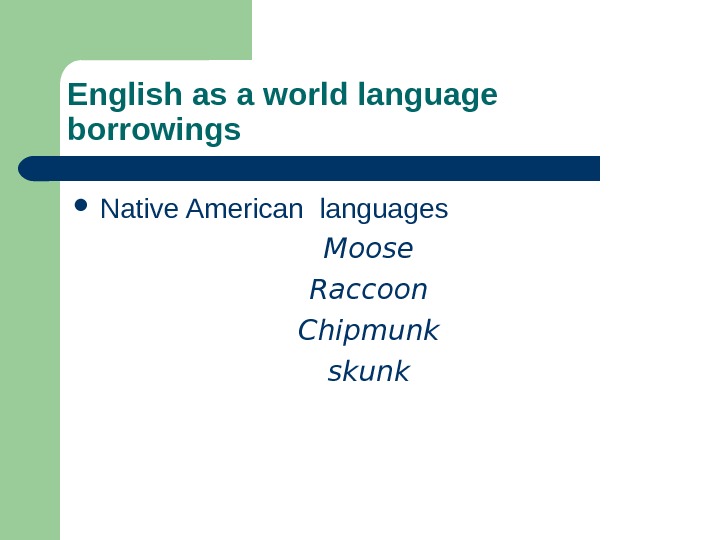
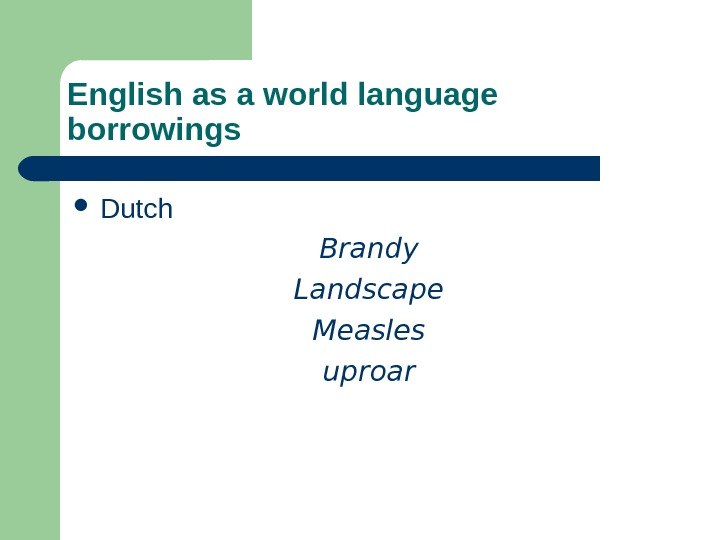
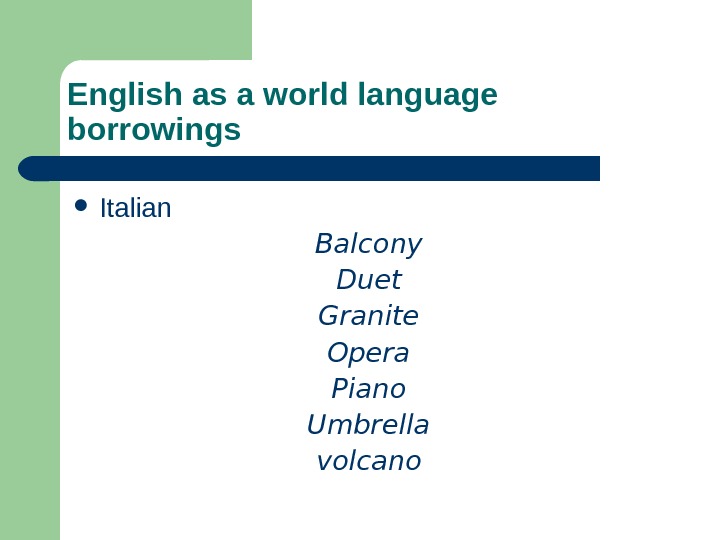
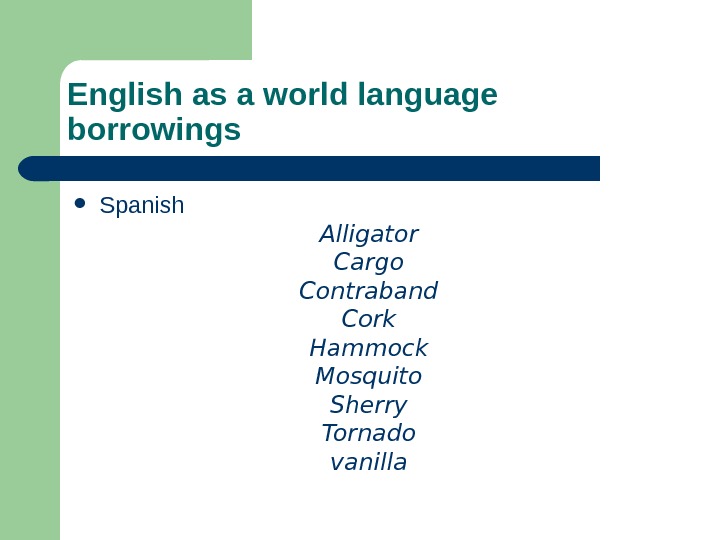
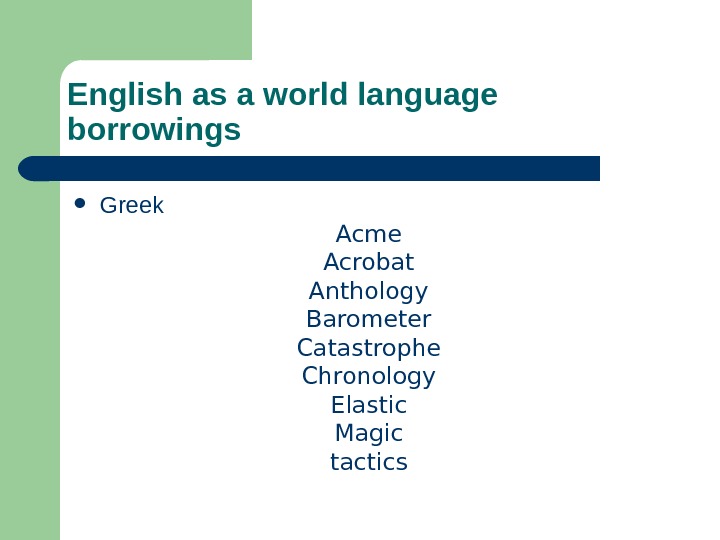
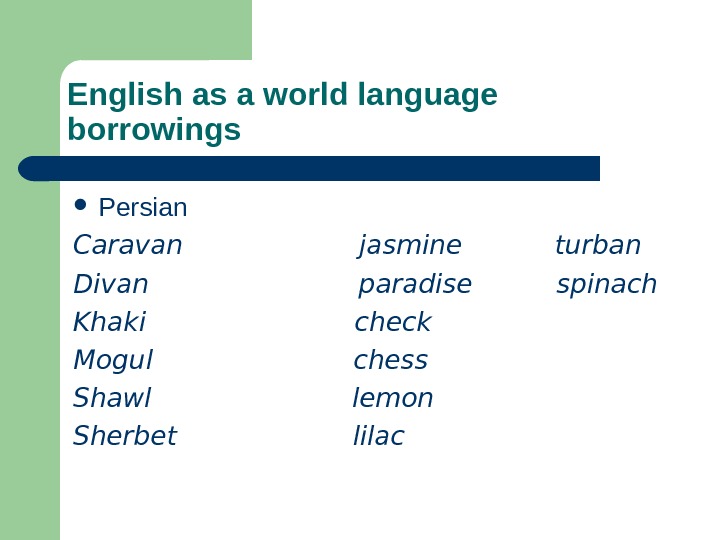
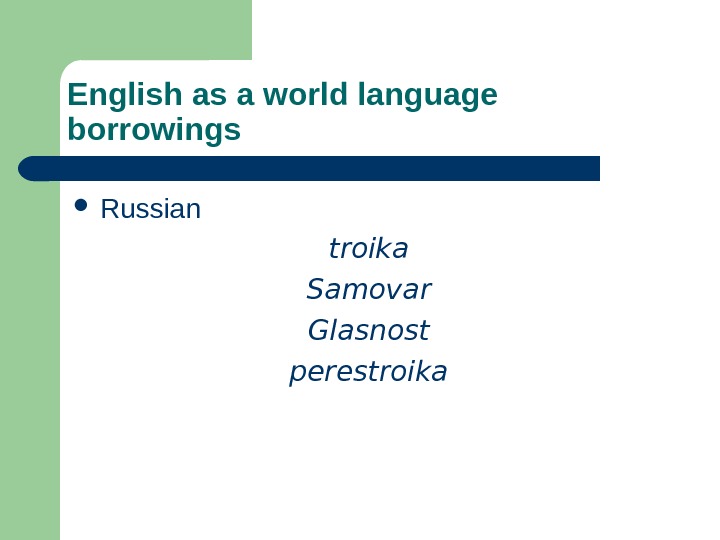
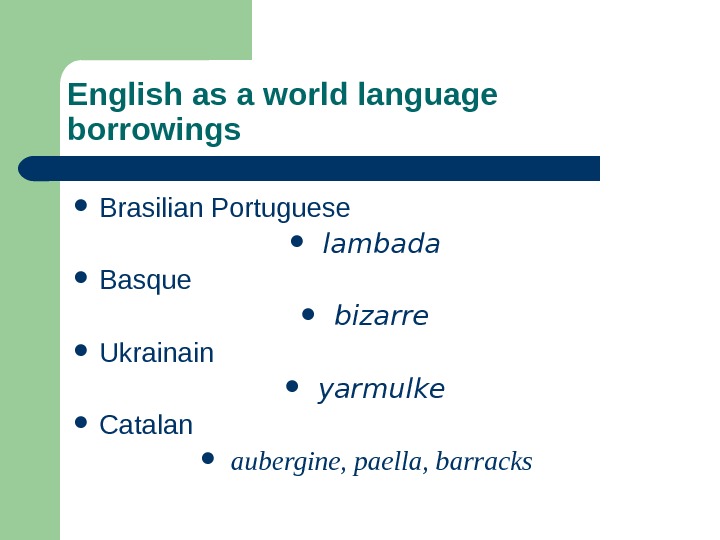
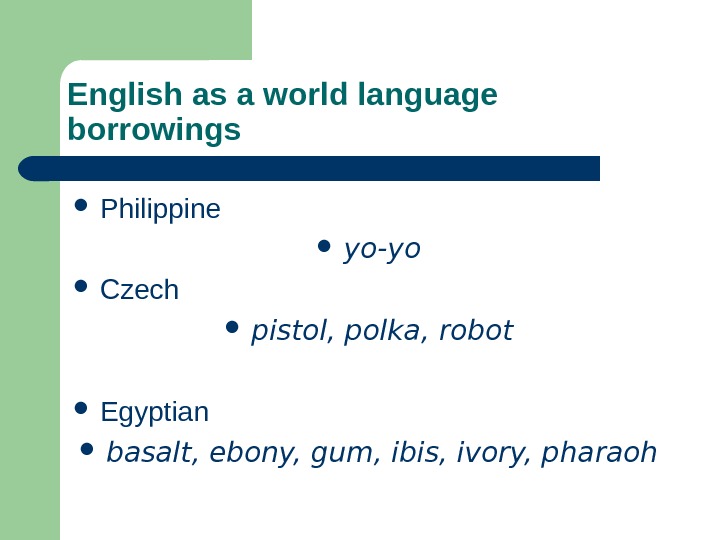
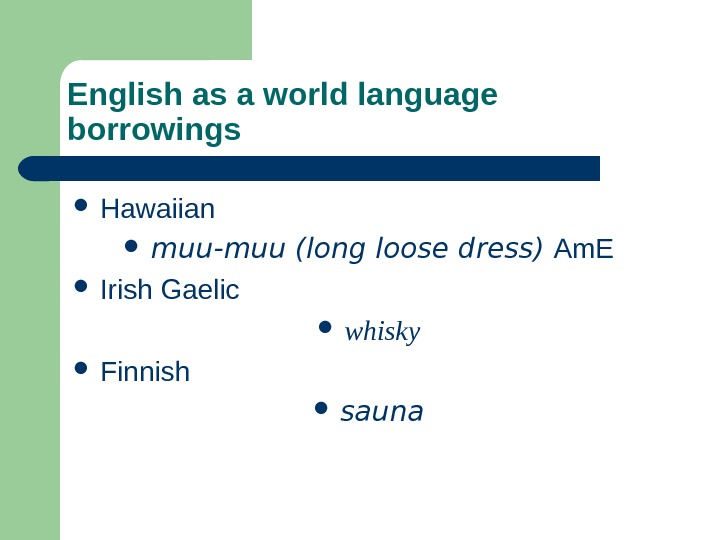
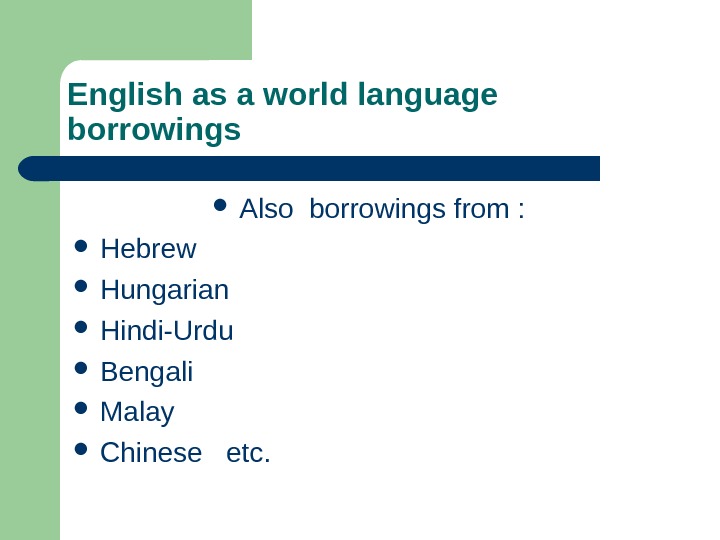
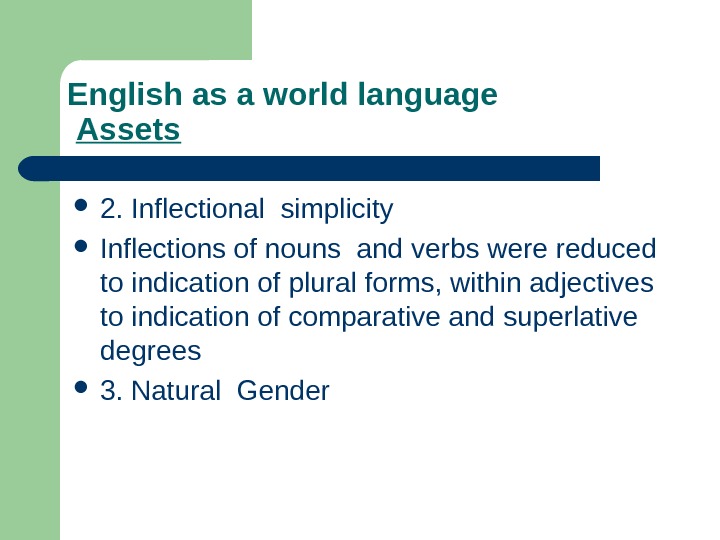
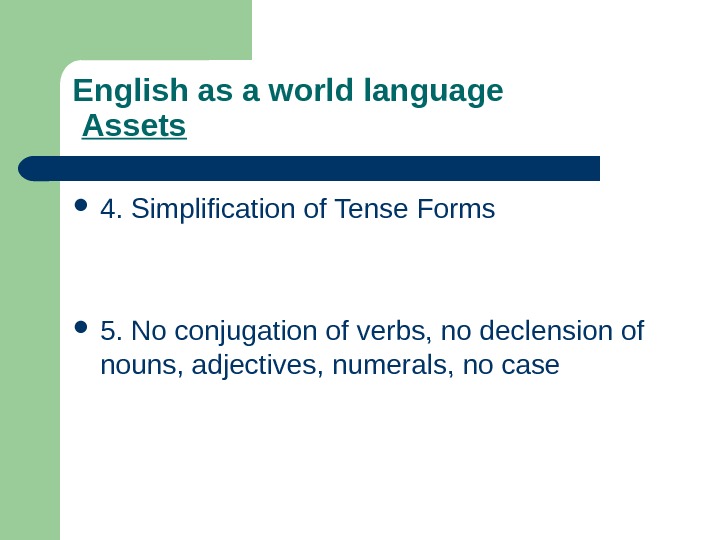
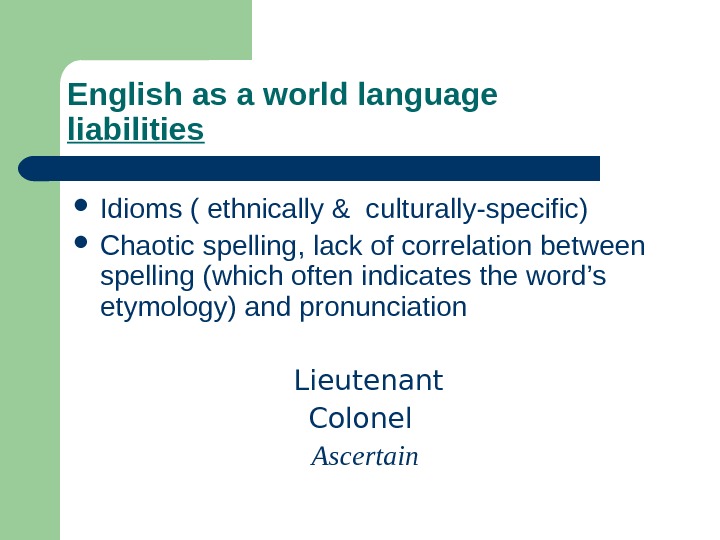
- Размер: 2.4 Mегабайта
- Количество слайдов: 76
Описание презентации History of English Middle English Reestablishment of по слайдам
 History of English Middle English
History of English Middle English
 Reestablishment of English The situation changed after 1200 A feeling of rivalry developed between the 2 countries and finally anti-foreign movement resulted into the Hundred Years’ War.
Reestablishment of English The situation changed after 1200 A feeling of rivalry developed between the 2 countries and finally anti-foreign movement resulted into the Hundred Years’ War.
 Reestablishment of English During two centuries after Norman Conquest French was necessary for upper classes, in the 13 th and 14 th centuries its maintenance became quite artificial. The spread of English among upper classes was making steady progress.
Reestablishment of English During two centuries after Norman Conquest French was necessary for upper classes, in the 13 th and 14 th centuries its maintenance became quite artificial. The spread of English among upper classes was making steady progress.
 Reestablishment of English The tendency to speak English was becoming stronger even in such conservative institutions as church and university. The 14 th century Oxford and Cambridge needed students to construe and translate in both English and French
Reestablishment of English The tendency to speak English was becoming stronger even in such conservative institutions as church and university. The 14 th century Oxford and Cambridge needed students to construe and translate in both English and French
 Reestablishment of English The fact which helped English to recover its former prestige was the rise of substantial middle class, as well as of two other important groups – craftsmen and merchants.
Reestablishment of English The fact which helped English to recover its former prestige was the rise of substantial middle class, as well as of two other important groups – craftsmen and merchants.
 Reestablishment of English In 1352 the mayor and the aldermen of London ordered that the trial would be in English not in French In 1362 an important step was taken toward restoring English in the country, namely in legal system.
Reestablishment of English In 1352 the mayor and the aldermen of London ordered that the trial would be in English not in French In 1362 an important step was taken toward restoring English in the country, namely in legal system.
 Reestablishment of English The last step that the English language had to make its gradual ascent was its employment in school. It had to meet the competition with Latin and French.
Reestablishment of English The last step that the English language had to make its gradual ascent was its employment in school. It had to meet the competition with Latin and French.
 Middle English Linguistic characteristics Fast and considerable changes in grammar and vocabulary. Decay of inflectional endings. Losses among strong verbs Strong Verbs become weak Loss of grammatical gender
Middle English Linguistic characteristics Fast and considerable changes in grammar and vocabulary. Decay of inflectional endings. Losses among strong verbs Strong Verbs become weak Loss of grammatical gender
 Middle English Linguistic characteristics Of the 10. 000 words adapted from Norman French , ¾ are still in use: justice, jury, damage, prison, marriage, sovereign, parliament, prince, viscount, baron etc. But king & queen are of Germanic origin.
Middle English Linguistic characteristics Of the 10. 000 words adapted from Norman French , ¾ are still in use: justice, jury, damage, prison, marriage, sovereign, parliament, prince, viscount, baron etc. But king & queen are of Germanic origin.
 Loans from Norman French The Norman flood brought us picture, question, treasure, mercy, suspense, reception, immediate, pure, crime, subtle, exempt, suffice, mirror, music, defend, control, journal, multiply, journey, region, country, office and countless others.
Loans from Norman French The Norman flood brought us picture, question, treasure, mercy, suspense, reception, immediate, pure, crime, subtle, exempt, suffice, mirror, music, defend, control, journal, multiply, journey, region, country, office and countless others.
 Loans from Norman French Practically all of English words beginning with /v/ are of Norman French origin: virtue, vanity, vowel, virgin, vassal, vault, vary, value, vacant, vanquish, vermin and very.
Loans from Norman French Practically all of English words beginning with /v/ are of Norman French origin: virtue, vanity, vowel, virgin, vassal, vault, vary, value, vacant, vanquish, vermin and very.
 Loans from Norman French Native English words never contain the digraph , and almost all words containing it come from Norman French: oil, coin, boil, join, point, poison, soil, cloy, toil, loyal, royal, joy, poise, foil, destroy, alloy, ointment and others.
Loans from Norman French Native English words never contain the digraph , and almost all words containing it come from Norman French: oil, coin, boil, join, point, poison, soil, cloy, toil, loyal, royal, joy, poise, foil, destroy, alloy, ointment and others.
 Loans from Norman French contributed practically the entire traditional vocabulary of linguistics: language, sentence, question, noun, verb, adjective, pronoun, tense, case, participle, infinitive, subject, object and many more.
Loans from Norman French contributed practically the entire traditional vocabulary of linguistics: language, sentence, question, noun, verb, adjective, pronoun, tense, case, participle, infinitive, subject, object and many more.
 Loans from Norman French In fact, even such everyday Old English words as andwlita, ea, weald and berg disappeared from the language, replaced by their French equivalents face, river, forest and mountain. Old English dal was reduced to a regionalism, dale, and the normal word became valley.
Loans from Norman French In fact, even such everyday Old English words as andwlita, ea, weald and berg disappeared from the language, replaced by their French equivalents face, river, forest and mountain. Old English dal was reduced to a regionalism, dale, and the normal word became valley.
 Native English Personal pronouns, grammatical words, number names, most body-part names, most kinship terms, names of basic materials, most names of natural phenomena and of geographical features, everyday verbs and adjectives – all are native English : me, you, and, the, with, to, in, not, two, seven, head, heart, arm, foot, man, woman, child, father, mother, daughter, stone, wood, iron, gold, sun, moon, star, wind, rain, snow, tree, road, path, stream, ford, bridge, come, go, think, believe, speak, wonder, live, laugh, stink, red, black, old, young, new, little and short.
Native English Personal pronouns, grammatical words, number names, most body-part names, most kinship terms, names of basic materials, most names of natural phenomena and of geographical features, everyday verbs and adjectives – all are native English : me, you, and, the, with, to, in, not, two, seven, head, heart, arm, foot, man, woman, child, father, mother, daughter, stone, wood, iron, gold, sun, moon, star, wind, rain, snow, tree, road, path, stream, ford, bridge, come, go, think, believe, speak, wonder, live, laugh, stink, red, black, old, young, new, little and short.
 Middle English By the end of the Middle English period, the Germanic element in the English vocabulary had been firmly put in the shade by a Romance and Italian lexical invasion of unprecedented proportions.
Middle English By the end of the Middle English period, the Germanic element in the English vocabulary had been firmly put in the shade by a Romance and Italian lexical invasion of unprecedented proportions.
 Middle English French Influence on the Vocabulary The peak of borrowing was the last quarter of the 14 th century, when over 2. 500 French words are identified.
Middle English French Influence on the Vocabulary The peak of borrowing was the last quarter of the 14 th century, when over 2. 500 French words are identified.
 Middle English French Influence on the Vocabulary Governmental and Administrative words: Crown, state, empire, reign, royal, authority, majesty, tyrant, oppress, assembly, tax, revenue Ecclesiastical words Religion, theology, baptism, sermon, passion, clergy, pastor, hermit etc.
Middle English French Influence on the Vocabulary Governmental and Administrative words: Crown, state, empire, reign, royal, authority, majesty, tyrant, oppress, assembly, tax, revenue Ecclesiastical words Religion, theology, baptism, sermon, passion, clergy, pastor, hermit etc.
 Middle English French Influence on the Vocabulary Law Arrest, blame, convict, legacy, executor, evidence, fine, prison, etc. Army and Navy Army, navy, battle, combat, siege, ambush, retreat, banner, defend etc.
Middle English French Influence on the Vocabulary Law Arrest, blame, convict, legacy, executor, evidence, fine, prison, etc. Army and Navy Army, navy, battle, combat, siege, ambush, retreat, banner, defend etc.
 Middle English French Influence on the Vocabulary Fashion, Social life, Meals Collar, gown, robe, garment, lace, blue, brown, scarlet, jewel, ivory, diamond, sapphire, pearl, amethyst, topaz, oyster, salad, olives, toast, biscuit, grape, orange, pastry, tart, jelly
Middle English French Influence on the Vocabulary Fashion, Social life, Meals Collar, gown, robe, garment, lace, blue, brown, scarlet, jewel, ivory, diamond, sapphire, pearl, amethyst, topaz, oyster, salad, olives, toast, biscuit, grape, orange, pastry, tart, jelly
 Middle English French Influence on the Vocabulary Synonyms at Three Levels due to mixture of Latin, French and native elements: Ask- question- interrogate Holy – sacred- consecrated Time- age- epoch Rise – mount- ascend Goodness – virtue — probity ( English – French- Latin)
Middle English French Influence on the Vocabulary Synonyms at Three Levels due to mixture of Latin, French and native elements: Ask- question- interrogate Holy – sacred- consecrated Time- age- epoch Rise – mount- ascend Goodness – virtue — probity ( English – French- Latin)
 Lexical alternatives Germanic French Latin Climb ascend Fast firm secure Fire flame conflagration House mansion Kingly royal regal
Lexical alternatives Germanic French Latin Climb ascend Fast firm secure Fire flame conflagration House mansion Kingly royal regal
 Middle English -ful was used to generate adjectives from nouns: full of +N = beautiful, graceful, merciful; in Middle English there have been lots of adj
Middle English -ful was used to generate adjectives from nouns: full of +N = beautiful, graceful, merciful; in Middle English there have been lots of adj
 Middle English The French -able suffix combined with English roots to produce findable, speakable, makeable, unknowable In discovering used as a noun we have a French prefix and an English suffix sandwiching a French word.
Middle English The French -able suffix combined with English roots to produce findable, speakable, makeable, unknowable In discovering used as a noun we have a French prefix and an English suffix sandwiching a French word.
 Middle English French introduced Latin-derived suffixes de-, dis- en, ex-, pre-, pro-, -able, -ence, -ant, ity, -ment, -tion (spelt as -cion)
Middle English French introduced Latin-derived suffixes de-, dis- en, ex-, pre-, pro-, -able, -ence, -ant, ity, -ment, -tion (spelt as -cion)
 Middle English Every word developed its range of collocations: royal blue, Royal Highness, Royal Shakespeare Company; blood royal, banners royal Regal look/ performance/confidence
Middle English Every word developed its range of collocations: royal blue, Royal Highness, Royal Shakespeare Company; blood royal, banners royal Regal look/ performance/confidence
 Middle English Dialects Northern East Midland West Midland Southern
Middle English Dialects Northern East Midland West Midland Southern

 Middle English Dialects Prof. Barber noticed “Early Middle English texts give the impression of a chaos of dialects, without any common conventions in pronunciation or spelling, and wide divergence in grammar and vocabulary”
Middle English Dialects Prof. Barber noticed “Early Middle English texts give the impression of a chaos of dialects, without any common conventions in pronunciation or spelling, and wide divergence in grammar and vocabulary”
 Middle English Rise of Standard English East Midland type of English, particularly dialect of its metropolis became the basis of Standard English. 1) It was less conservative than the Southern dialect and less radical than Northern dialect.
Middle English Rise of Standard English East Midland type of English, particularly dialect of its metropolis became the basis of Standard English. 1) It was less conservative than the Southern dialect and less radical than Northern dialect.
 Middle English Rise of Standard English 2) The East Midland district was the largest and the most populated dialect area 3) The presence of Oxford and Cambridge Universities in the area 4) The importance of London as the capital of England
Middle English Rise of Standard English 2) The East Midland district was the largest and the most populated dialect area 3) The presence of Oxford and Cambridge Universities in the area 4) The importance of London as the capital of England
 Middle English Trilingualism VS Standard English By the 16 th century, trilingualism would have been restricted to a specialised, chiefly legal elite. But earlier educated English people were naturally trilingual: English was their mother tongue, Latin was the required language of church, was necessary in political-legal matters. French was necessary for administrative matters and to be fashionable throughout Western European society.
Middle English Trilingualism VS Standard English By the 16 th century, trilingualism would have been restricted to a specialised, chiefly legal elite. But earlier educated English people were naturally trilingual: English was their mother tongue, Latin was the required language of church, was necessary in political-legal matters. French was necessary for administrative matters and to be fashionable throughout Western European society.
 Middle English As the Middle English progressed, legal English, philosophical English, medical English, literary English, parliamentary English and other varieties started to appear.
Middle English As the Middle English progressed, legal English, philosophical English, medical English, literary English, parliamentary English and other varieties started to appear.
 The Renaissance 1500 -1650 The Problem of Orthography No generally accepted system that anyone could conform to Adaptation of borrowings (brevity< brevitas, external< externus)
The Renaissance 1500 -1650 The Problem of Orthography No generally accepted system that anyone could conform to Adaptation of borrowings (brevity< brevitas, external< externus)
 Middle English Casualness of usage and style was a hallmark of the Middle and early Modern English periods. Chaucer sometimes used daughters, or doughtren, or doughtres. He appeared to settle on whichever form first popped into his head, even at the risk of being inconsistent from one paragraph to the next.
Middle English Casualness of usage and style was a hallmark of the Middle and early Modern English periods. Chaucer sometimes used daughters, or doughtren, or doughtres. He appeared to settle on whichever form first popped into his head, even at the risk of being inconsistent from one paragraph to the next.
 Spelling Fluctuation At this time, and for centuries afterwards, such fluctuation in spelling within a single document was commonplace. With the introduction of printing into England in the 1470 s, English spelling began to grow more consistent, since the printers found it convenient to choose particular spellings and to stick to these as far as possible. But standardisation was a slow process. William Shakespeare, for instance, spelled his own name in several different ways – and fluctuation in spelling was still common in the seventeenth century, and far from rare in the eighteenth.
Spelling Fluctuation At this time, and for centuries afterwards, such fluctuation in spelling within a single document was commonplace. With the introduction of printing into England in the 1470 s, English spelling began to grow more consistent, since the printers found it convenient to choose particular spellings and to stick to these as far as possible. But standardisation was a slow process. William Shakespeare, for instance, spelled his own name in several different ways – and fluctuation in spelling was still common in the seventeenth century, and far from rare in the eighteenth.
 Spelling Fluctuation, potato the word potato. This word was taken into English in the 16 th century, via Spanish from the native American language Taino. In the 16 th century, we find all of the following spellings in use in English: botata, battata, potato, potaton, potade, patata, potatoe and the bizarre potatus , a confused Latinism. By the 17 th century, only some of these were still in use, but then we find the further spellings partato, potado, potata, pottato and puttato.
Spelling Fluctuation, potato the word potato. This word was taken into English in the 16 th century, via Spanish from the native American language Taino. In the 16 th century, we find all of the following spellings in use in English: botata, battata, potato, potaton, potade, patata, potatoe and the bizarre potatus , a confused Latinism. By the 17 th century, only some of these were still in use, but then we find the further spellings partato, potado, potata, pottato and puttato.
 Spelling Fluctuation, potato the word potato By the 18 th century, this variation had been narrowed down to just three choices: potato, patata and potatoe. By the 19 th century, only potato and potatoe were still in the running. The frequency of this second choice is one reason that we require the plural form potatoes today, even though we have finally settled on the singular form potato.
Spelling Fluctuation, potato the word potato By the 18 th century, this variation had been narrowed down to just three choices: potato, patata and potatoe. By the 19 th century, only potato and potatoe were still in the running. The frequency of this second choice is one reason that we require the plural form potatoes today, even though we have finally settled on the singular form potato.
 Royal Chancery Standard In the early 1400 s, young men who had been educated first in English rather than French began to take their places within the royal administration. By 1420– 30, these men were now in positions of considerable authority. In using a written English derived from the practices of a limited number of London schools, a new, highly influential, ‘house style’ began to spread in the administration. This house style – dubbed Chancery Standard after the Royal Chancery by scholars – was quickly exported outside government.
Royal Chancery Standard In the early 1400 s, young men who had been educated first in English rather than French began to take their places within the royal administration. By 1420– 30, these men were now in positions of considerable authority. In using a written English derived from the practices of a limited number of London schools, a new, highly influential, ‘house style’ began to spread in the administration. This house style – dubbed Chancery Standard after the Royal Chancery by scholars – was quickly exported outside government.
 Royal Chancery Standard People wishing favours would naturally write in a way intended to be ingratiating to the centre; the fact that the new style was inevitably seen as the ‘voice of the king’ could not have hindered its spread. By 1500, the Chancery Standard had become the primary, and soon after the only, acceptable form of written English.
Royal Chancery Standard People wishing favours would naturally write in a way intended to be ingratiating to the centre; the fact that the new style was inevitably seen as the ‘voice of the king’ could not have hindered its spread. By 1500, the Chancery Standard had become the primary, and soon after the only, acceptable form of written English.
 The Renaissance 1500 -1650 Words from the Romance languages: Chocolate, bizarre, detail, duel, entrance, progress, tomato, vogue, essay, shock, equip, volunteer
The Renaissance 1500 -1650 Words from the Romance languages: Chocolate, bizarre, detail, duel, entrance, progress, tomato, vogue, essay, shock, equip, volunteer
 The Renaissance 1500 -1650 Thomas More introduced the words: absurdity, acceptance, anticipate, contradictory, durable, exaggerate, explain, detector, frivolous, monopoly, paradox, pretext
The Renaissance 1500 -1650 Thomas More introduced the words: absurdity, acceptance, anticipate, contradictory, durable, exaggerate, explain, detector, frivolous, monopoly, paradox, pretext
 The Renaissance 1500 -1650 Among Shakespearean words we find antipathy, catastrophe, critical, demonstrate, emphasis, extract, meditate, modest,
The Renaissance 1500 -1650 Among Shakespearean words we find antipathy, catastrophe, critical, demonstrate, emphasis, extract, meditate, modest,
 Shakespeare coined 2000 words and gave us countless phrases: to be or not to be, to be cruel to be kind, flesh and blood, cold comfort, remembrance of things past, the sound and the fury, vanish into thin air, in my mind’s eye etc…
Shakespeare coined 2000 words and gave us countless phrases: to be or not to be, to be cruel to be kind, flesh and blood, cold comfort, remembrance of things past, the sound and the fury, vanish into thin air, in my mind’s eye etc…
 History of English and its present Much of English vocabulary was lost Change of meaning in numerous words: Shakespearean English VS Current English foolish nice a cold in the head rheumatism
History of English and its present Much of English vocabulary was lost Change of meaning in numerous words: Shakespearean English VS Current English foolish nice a cold in the head rheumatism
 The emergence of linguistic lexicon 1500 -1700 Alphabet (1580) gave rise to alphabetarian, alphabetic, alphabetically Linguist (skilled in the usage of languages) → a student of languages; linguacity, linguacious, linguister , none of the derivatives survived
The emergence of linguistic lexicon 1500 -1700 Alphabet (1580) gave rise to alphabetarian, alphabetic, alphabetically Linguist (skilled in the usage of languages) → a student of languages; linguacity, linguacious, linguister , none of the derivatives survived
 The emergence of linguistic lexicon 1500 -1700 Colon Comma Dissonance Lexicon Parenthesis Philological Pronoun Rhetoricise Substantive trope
The emergence of linguistic lexicon 1500 -1700 Colon Comma Dissonance Lexicon Parenthesis Philological Pronoun Rhetoricise Substantive trope
 The 18 th century Development of Progressive Verb Forms In Shakespearean times one would ask ‘What do you read? ’ not ‘What are you reading’. ‘ The bridge is being built’ was unknown.
The 18 th century Development of Progressive Verb Forms In Shakespearean times one would ask ‘What do you read? ’ not ‘What are you reading’. ‘ The bridge is being built’ was unknown.
 The 17 th- 18 th century English Dictionaries From the 17 th century on, dictionaries of English began to be written, and the decisions of the lexicographers (dictionary-writers) helped to provide some further stabilisation. Even so, by the time of American independence in 1783, English spelling was still not fully fixed: there were still a number of words with multiple spellings.
The 17 th- 18 th century English Dictionaries From the 17 th century on, dictionaries of English began to be written, and the decisions of the lexicographers (dictionary-writers) helped to provide some further stabilisation. Even so, by the time of American independence in 1783, English spelling was still not fully fixed: there were still a number of words with multiple spellings.
 The 17 th- 18 th century 1755 A Dictionary of English Language by Samuel Johnson
The 17 th- 18 th century 1755 A Dictionary of English Language by Samuel Johnson
 Samuel Johnson — -ize – ise English has a verb-forming suffix -ize, of Greek origin ( realize, civilize , satirize, demonize, finalize and hospitalize etc). Traditionally, this suffix was spelled -ize in English, and it still is in American English, where nothing has happened. In French, however, the spelling –izer gave way centuries ago to the changed spelling -iser, as in French civiliser ‘civilise’. As so often, what the French were doing induced the British to do the same, and so many British writers began to write realise and civilise. By Johnson’s day, these new spellings had become common, and Johnson gave them his seal of approval.
Samuel Johnson — -ize – ise English has a verb-forming suffix -ize, of Greek origin ( realize, civilize , satirize, demonize, finalize and hospitalize etc). Traditionally, this suffix was spelled -ize in English, and it still is in American English, where nothing has happened. In French, however, the spelling –izer gave way centuries ago to the changed spelling -iser, as in French civiliser ‘civilise’. As so often, what the French were doing induced the British to do the same, and so many British writers began to write realise and civilise. By Johnson’s day, these new spellings had become common, and Johnson gave them his seal of approval.
 The 17 th- 18 th century Samuel Johnson — theatre, centre Much the same thing has happened with another familiar group of words spelled differently on the two sides of the Atlantic: the group represented by the words theatre and centre. The traditional English spellings of these are theater , center , and so on, and these spellings were well established by the 17 th century.
The 17 th- 18 th century Samuel Johnson — theatre, centre Much the same thing has happened with another familiar group of words spelled differently on the two sides of the Atlantic: the group represented by the words theatre and centre. The traditional English spellings of these are theater , center , and so on, and these spellings were well established by the 17 th century.
 The 17 th- 18 th century Samuel Johnson — theatre, centre But, of course, the French spellings of these words are théatre , centre , and so on. Eager to claim some of the prestige of French for their own language, British writers began using the French spellings in English, and again Dr Johnson approved the new spellings. But the older spellings remain undisturbed in American English, where they are likewise the only possibilities.
The 17 th- 18 th century Samuel Johnson — theatre, centre But, of course, the French spellings of these words are théatre , centre , and so on. Eager to claim some of the prestige of French for their own language, British writers began using the French spellings in English, and again Dr Johnson approved the new spellings. But the older spellings remain undisturbed in American English, where they are likewise the only possibilities.
 British VS American Spelling Why did these French-inspired changes in spelling find no lasting foothold in American English? The breadth of the Atlantic Ocean was no doubt one factor. But there was another one, much more important: Noah Webster (1758– 1843).
British VS American Spelling Why did these French-inspired changes in spelling find no lasting foothold in American English? The breadth of the Atlantic Ocean was no doubt one factor. But there was another one, much more important: Noah Webster (1758– 1843).
 The 19 th century and after Influences affecting English The growth of Science Automobile, Film, Broadcasting, Computer
The 19 th century and after Influences affecting English The growth of Science Automobile, Film, Broadcasting, Computer
 Brief History of English Factors that contributed to the development The 100 years war Rise of middle class The Renaissance The Development of English as maritime power The expansion of the British Empire The growth of commerce and industry The growth of science and literature Economic & technical superiority & English
Brief History of English Factors that contributed to the development The 100 years war Rise of middle class The Renaissance The Development of English as maritime power The expansion of the British Empire The growth of commerce and industry The growth of science and literature Economic & technical superiority & English
 Present of English With over 1. 5 billion speakers of English around the globe , the English of England is today a tiny minority dialect of ‘World English’.
Present of English With over 1. 5 billion speakers of English around the globe , the English of England is today a tiny minority dialect of ‘World English’.
 Present of English Varieties of English and variability of English nowadays English as a global language World Englishes (Caribbean English, Indian English, Singlish, Konglish, Frenglish, Spanglish etc. )
Present of English Varieties of English and variability of English nowadays English as a global language World Englishes (Caribbean English, Indian English, Singlish, Konglish, Frenglish, Spanglish etc. )
 Present of English Many terms have evolved to characterize nonstandard varieties of English — scientific, objective, popular, impressionistic, insulting: Regional dialects Modified standards Nonstandard speech Creoles Pigeons Vernaculars Code-mixing Substandard speech Country talk Argot Lingo Broken English Gutter speech
Present of English Many terms have evolved to characterize nonstandard varieties of English — scientific, objective, popular, impressionistic, insulting: Regional dialects Modified standards Nonstandard speech Creoles Pigeons Vernaculars Code-mixing Substandard speech Country talk Argot Lingo Broken English Gutter speech
 Standard English Most English speakers do not speak Standard English. A significant number of English authors do not write in Standard English. And a large number of those using English in computer-mediated communication do not use it either. (David Crystal The Stories of English )
Standard English Most English speakers do not speak Standard English. A significant number of English authors do not write in Standard English. And a large number of those using English in computer-mediated communication do not use it either. (David Crystal The Stories of English )
 Rivals of English is more used but less loved, French is more loved but less used
Rivals of English is more used but less loved, French is more loved but less used
 English as a world language Assets and liabilities 1. Cosmopolitan vocabulary – borrowing from numerous languages
English as a world language Assets and liabilities 1. Cosmopolitan vocabulary – borrowing from numerous languages
 English as a world language borrowings Native American languages Moose Raccoon Chipmunk skunk
English as a world language borrowings Native American languages Moose Raccoon Chipmunk skunk
 English as a world language borrowings Dutch Brandy Landscape Measles uproar
English as a world language borrowings Dutch Brandy Landscape Measles uproar
 English as a world language borrowings Italian Balcony Duet Granite Opera Piano Umbrella volcano
English as a world language borrowings Italian Balcony Duet Granite Opera Piano Umbrella volcano
 English as a world language borrowings Spanish Alligator Cargo Contraband Cork Hammock Mosquito Sherry Tornado vanilla
English as a world language borrowings Spanish Alligator Cargo Contraband Cork Hammock Mosquito Sherry Tornado vanilla
 English as a world language borrowings Greek Acme Acrobat Anthology Barometer Catastrophe Chronology Elastic Magic tactics
English as a world language borrowings Greek Acme Acrobat Anthology Barometer Catastrophe Chronology Elastic Magic tactics
 English as a world language borrowings Persian Caravan jasmine turban Divan paradise spinach Khaki check Mogul chess Shawl lemon Sherbet lilac
English as a world language borrowings Persian Caravan jasmine turban Divan paradise spinach Khaki check Mogul chess Shawl lemon Sherbet lilac
 English as a world language borrowings Russian troika Samovar Glasnost perestroika
English as a world language borrowings Russian troika Samovar Glasnost perestroika
 English as a world language borrowings Brasilian Portuguese lambada Basque bizarre Ukrainain yarmulke Catalan aubergine, paella, barracks
English as a world language borrowings Brasilian Portuguese lambada Basque bizarre Ukrainain yarmulke Catalan aubergine, paella, barracks
 English as a world language borrowings Philippine yo-yo Czech pistol, polka, robot Egyptian basalt, ebony, gum, ibis, ivory, pharaoh
English as a world language borrowings Philippine yo-yo Czech pistol, polka, robot Egyptian basalt, ebony, gum, ibis, ivory, pharaoh
 English as a world language borrowings Hawaiian muu-muu (long loose dress) Am. E Irish Gaelic whisky Finnish sauna
English as a world language borrowings Hawaiian muu-muu (long loose dress) Am. E Irish Gaelic whisky Finnish sauna
 English as a world language borrowings Also borrowings from : Hebrew Hungarian Hindi-Urdu Bengali Malay Chinese etc.
English as a world language borrowings Also borrowings from : Hebrew Hungarian Hindi-Urdu Bengali Malay Chinese etc.
 English as a world language Assets 2. Inflectional simplicity Inflections of nouns and verbs were reduced to indication of plural forms, within adjectives to indication of comparative and superlative degrees 3. Natural Gender
English as a world language Assets 2. Inflectional simplicity Inflections of nouns and verbs were reduced to indication of plural forms, within adjectives to indication of comparative and superlative degrees 3. Natural Gender
 English as a world language Assets 4. Simplification of Tense Forms 5. No conjugation of verbs, no declension of nouns, adjectives, numerals, no case
English as a world language Assets 4. Simplification of Tense Forms 5. No conjugation of verbs, no declension of nouns, adjectives, numerals, no case
 English as a world language liabilities Idioms ( ethnically & culturally-specific) Chaotic spelling, lack of correlation between spelling (which often indicates the word’s etymology) and pronunciation Lieutenant Colonel Ascertain
English as a world language liabilities Idioms ( ethnically & culturally-specific) Chaotic spelling, lack of correlation between spelling (which often indicates the word’s etymology) and pronunciation Lieutenant Colonel Ascertain

